Certainly, it is difficult to make the demands of the Gospel understandable to secularized people. But this pastoral difficulty must not lead to compromises with the truth.
Distinction Matter - Subscribed Feeds
-
Site: RT - News
Venezuelan farmer Juan Vicente Perez Mora has passed away two months before his 115th birthday
The world’s oldest man, Juan Vicente Perez Mora, died at the age of 114 on Tuesday in Venezuela, according to local officials.
The retired farmer became the oldest living male in 2020, and was officially recognized as such by Guinness World Records in 2022, when he was 112.
Perez died two just months before his 115th birthday in Venezuelan state of Tachira, according to Governor Freddy Bernal.
“Our dear Juan Vicente Perez Mora, today with deep sadness and pain we say goodbye to you, to that archetype of a man from Tachira, humble, hard-working, peaceful, enthusiastic about family and tradition,” Bernal wrote on X (formerly Twitter).
Venezuelan President Nicolas Maduro commented on his passing, saying: “Juan Vicente Perez Mora has transcended into eternity at 114 years old.”
Perez was born in the town of El Cobre, in the Andean state of Tachira on May 27, 1909 and was the ninth of ten children. The farmer, known as Tio Vicente, began working at age five with his father and brothers, helping with the sugar cane and coffee harvest, according to a 2022 statement by the Guinness World Records.
READ MORE: Africa’s youngest elected president takes power
While still working in agriculture, Perez went on to become a sheriff in Caricuena in 1948 and was responsible for resolving land and family disputes for ten years, Guinness said.
A father of 11 children, as of 2022 he had 42 grandchildren, 18 great-grandchildren and 12 great-great-grandchildren.
His secret to a long life, according to Guinness World Records, was to “work hard, rest on holidays, go to bed early, drink a glass of aguardiente every day, love God, and always carry him in your heart.”
Currently the world’s oldest living person is Maria Branyas Morera, who celebrated her 117th birthday in Catalonia, Spain, last month.
The oldest person ever was French woman Jeanne Calment, who lived to the age of 122 and died in 1997, according to Guinness.
-
Site: RT - News
A private university is under investigation for suspected organized criminal activity
A private university in Poland and a number of its high-profile graduates have become embroiled in a corruption scandal involving bribery and fake master’s degrees.
Poland’s Central Anti-Corruption Bureau (CBA) is investigating the Warsaw-based Collegium Humanum management university for illegal trade in MBA (Master of Business Administration) diplomas. According to local media, several well-known district councilors and city mayors are among the graduates of the establishment.
French newspaper Le Monde has described the scandal as an embarrassment to the entire Polish political elite and a symbol of nepotism in the country.
Holding an MBA is a prerequisite to accessing well-paid positions on the boards of Polish public companies and in local government. Collegium Humanum offers studies in management, finance and accounting, and law, among other areas. According to Le Monde, the university granted the diplomas after less than a semester.
The mayor of Wroclaw, Jacek Sutryk, is among the Collegium Humanum alumni. He also sits on the supervisory boards of two municipal companies and earns roughly $8,000 a month, according to local outlet tuwroclaw.com.
The scheme was uncovered over the last two years by media investigations and was taken up by the authorities in February. According to the CBA, a suspected organized criminal group within the university issued graduation documents for bribes amounting to $112,000. Seven people were arrested by the CBA over the past two months in connection with the case, including the university’s founder and rector. According to Le Monde, some 30 people linked to the establishment have been indicted.
The scheme was made possible in 2017, when the then-ruling Law and Justice party introduced a provision that lowered the requirements for positions in public companies. Previously, either a doctorate in economics or law, or a state exam was necessary, although the changes opened up the positions to graduates with an MBA.
Read more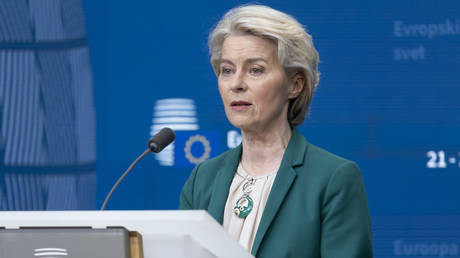 EU prosecutors take up Von der Leyen corruption probe – Politico
EU prosecutors take up Von der Leyen corruption probe – Politico
The mayor of Warsaw said last week that City Hall was conducting an audit of the individuals on supervisory bodies and the governing bodies of municipal companies. Rafal Trzaskowski warned that those who hold degrees from the controversial university would have to sit a state exam in order to keep their positions, local media reported.
Collegium Humanum has issued a statement saying that its operations “are in no way threatened” by the developments, and that the institution “continues its educational mission, ensuring the safety of students and staff.”
-
Site: RT - News
Hundreds of millions of dollars is being funneled to religious NGOs to entice and support illegal immigrants across the southern border
At a time when millions of Americans are homeless and in need of medical treatment, Washington is more concerned with playing host to millions of illegal immigrants south of the border.
How many Americans would like to receive cash debit cards, food, clothing, medical treatment, shelter, and even “humanitarian transportation” for doing absolutely nothing, aside from breaking the law? Well, sorry, because American citizens don’t qualify for the massive handout that surpasses $1.6 billion dollars, according to the Center for Immigration Studies. The freebies are going to millions of US-bound migrants in 17 Latin American nations and Mexico instead.
In what was once a matter of quiet speculation is now an open secret: the Biden administration is using hundreds of millions of dollars in taxpayer money to fund a variety of NGO initiatives aimed at helping illegal immigrants enter the US from Latin America and Mexico.
Under the auspices of a United Nations-led “Regional Refugee and Migrant Response Plan (RMRP),” the US State Department’s Bureau of Population, Refugees, and Migration (PRM) and the US Agency for International Development (USAID) have been sending taxpayer funds to various religious nonprofit organizations, which then dangle the juicy enticements before thousands of migrants, opening the floodgates to a wave of illegal US southern border crossings.
Read more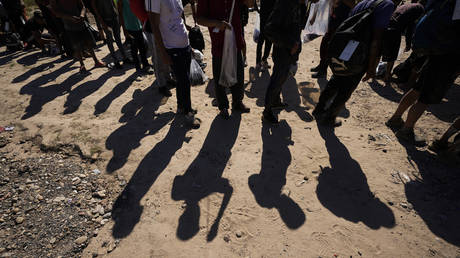 Elon Musk accuses Democrats of ‘importing voters’
Elon Musk accuses Democrats of ‘importing voters’
Exhibit number one. With an estimated 25% of the US population declaring membership in the Catholic Church, it might be expected that this denomination and its various offshoot organizations would spend the bulk of its funds tending to its American flock. Shockingly, that is not the case.
The prominent Catholic Charities USA and its various related agencies, for example, while not among those operating south of the border alongside the United Nations, receive “tens of millions of dollars in federal subsidies to oversee illegal immigrant transportation” north of the Rio Grande and resettlement operations to various sanctuary cities inside of the US.
At the same time, some 13 franchises of the nonprofit Caritas, whose website proudly pronounces that it is “inspired by the Catholic faith” and is “the helping hand of the Church,” will allocate $12.3 million to immigrants south of the border, much of it as hard cash, according to the UN database.
According to USA spending (here and here), and cited by Todd Bensman of CIS, USAID and the State Department’s PRM have doled out in excess of $11 million to the NGO Caritas Brazil, since the mass migration program started in 2021, including $3 million pledged through December 2024 to “overseas refugee assistance programs for the Western Hemisphere” that include “food, non-food items, shelter, health, [and] psychosocial support.”
It can’t go unnoticed that the same sanctuary cities that are putting illegal immigrants up in hotels while giving them free meal tickets, are the same places where thousands of tent cities overflowing with homeless people – many of them with serious medical problems and deadly addictions – have popped up over the last five years. Are the churches and various religious organizations opening their doors to these needy citizens? Judging by the deplorable state of the streets in America, it certainly doesn’t look like it, nor does the Biden administration seem to care.
Another example of a religious nonprofit serving as “co-smuggler” in the illegal trafficking of human flesh is the Hebrew Immigrant Aid Society, which has pledged $17.1 million in assistance to immigrants in at least seven Latin American nations during 2024, according to the UN’s RMRP planning documents. In fiscal year 2022, 47% of revenue reported by HIAS was the result of grants from government organizations, primarily from the State Department, but also from the Department of Homeland Security, according to the group’s tax filings and other sources, with the rest deriving from powerful corporate sponsors and other sources.
Read more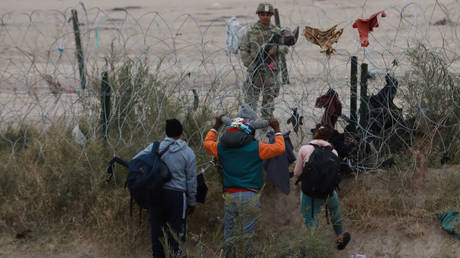 Civil war 2.0: What’s behind the latest escalation between Washington and Texas?
Civil war 2.0: What’s behind the latest escalation between Washington and Texas?
Meanwhile, in just the last year, the State Department’s PRM and USAID have forked over to the International Organization of Migration $1.4 billion, by far the highest amount on record, according to USAspending.gov.
So what’s going on here? Why is the Biden administration so obsessed with using taxpayer dollars to fund a massive influx of illegal immigrants into the country at a time when America already has enough poor people to take care of? Is it really the case that the Democrats are working on behalf of strictly humanitarian interests, or is something else at play? When dealing with the world of politics, it’s not a bad idea to think more in terms of power, not compassion.
In a nutshell, the Biden administration hopes to attract as many illegal immigrants into the country and turn them into loyal voters so Democrats can create a permanent one-party state. And judging by the outstanding numbers, the cynical strategy just might work.
The Immigration and Customs Enforcement (ICE) report for fiscal 2023 shows that the number of non-detained illegal immigrants has surged from 3.7 million in FY 2021 to nearly 4.8 million in FY 2022 and almost 6.2 million in FY 2023, making Joe Biden – in cahoots with faith-based NGOs – the greatest smuggler of human beings in the history of the United States.
-
Site: RT - News
The US president is “weaponizing federal agencies” against his political opponents, Robert F Kennedy Jr has said
President Joe Biden could be a bigger danger to US democracy than former president and presumptive 2024 election rival Donald Trump, another presidential candidate, Robert F Kennedy Jr, has said. Biden is the first president in US history to mobilize federal agencies to silence his political opponents, the politician stated.
Speaking on CNN on Monday, Kennedy Jr pointed to his being blocked on various social media platforms during Biden’s term in office and branded this as an effort to “censor political speech” that violated the First Amendment of America’s constitution. He also attributed the ‘censorship’ to pressure from the White House.
Pressed by CNN’s Erin Burnett on who he believes poses a bigger threat to democracy, Kennedy stated that he still views Biden as a bigger danger, even though Trump played a role in the January 6 riot at the US Capitol.
Read more Google hiding websites of Trump and other Biden challengers – report
Google hiding websites of Trump and other Biden challengers – report
“The question was, who is a worse threat to democracy? And what I would say is … I’m not going to answer that question. But I can argue that President Biden is, because the First Amendment, Erin, is the most important,” the candidate told presenter Erin Burnett.
“I can make the argument that President Biden is the much worse threat to democracy, and the reason for that is President Biden is the first candidate in history – the first president in history that has used the federal agencies to censor political speech, so to censor his opponent.”
The politician’s Instagram page was suspended in 2021 over what its parent company, Meta, described as “repeatedly sharing debunked claims about the coronavirus or vaccines.” The account was reinstated in 2022, shortly after Kennedy announced his election campaign.
Read more US presidential candidate vows to dismantle ‘military empire’
US presidential candidate vows to dismantle ‘military empire’
In December, the Supreme Court barred him from joining a challenge to a case dealing with the Biden administration’s communication with social media platforms over posts the government considered disinformation. The politician also had a similar case pending in a lower court.
Last year, Kennedy testified before the House Judiciary’s subcommittee on the weaponization of the federal government, where he spoke as part of a House Republicans’ inquiry into alleged social media censorship against conservatives. The politician also made freedom of speech a focus of his presidential campaign.
Kennedy, 70, is the son of former US Attorney General Robert Kennedy and the nephew of former US President John F Kennedy, each of whom was assassinated during the 1960s. He has gained notoriety recently for being a prominent critic of vaccines, in addition to calling for an end to “proxy wars” conducted by the US – but some of his critics have dismissed many of his positions as being conspiratorial in nature.
The former Democratic Party candidate is now campaigning as an independent ahead of the November vote. -
Site: RT - News
‘Sato’ may end up the only family name by year 2531 if married couples aren’t allowed to retain their own, research has concluded
Japanese citizens will all have the same family name in 500 years’ time unless married couples are permitted now to use separate surnames, a new study has suggested.
Organized by the Think Name Project and led by Hiroshi Yoshida, a professor of economy at Tohoku University, the study is part of a campaign to raise awareness of the implications of not amending a law dating back to the late 1800s.
If the government continues to require married couples to share the same surname then every single Japanese person will be known as ‘Sato-san’ by 2531, the research projected.
“If everyone becomes Sato, we may have to be addressed by our first names or by numbers,” Yoshida explained, according to media. “I don’t think that would be a good world to live in,” the academic added.
According to a March 2023 survey, ‘Sato’ already tops the list of Japanese last names, accounting for 1.5% of the total population, while ‘Suzuki’ comes a close second.
Read more Japanese court upholds same-sex marriage ban
Japanese court upholds same-sex marriage ban
Japan remains the only country in the world that requires spouses to use the same name. Couples reportedly have to choose which surname to share when they marry, but in 95% of cases, it is the woman who changes her name.
The government has, nevertheless, allowed maiden names to appear alongside married names on passports, driving licenses and residence certificates.
Meanwhile, conservative members of the ruling Liberal Democratic party (LDP) argue that changing the law would “undermine” family unity and cause confusion among children.
The study, published in March but first reported-on this week, sparked speculation of an April fools’ day prank, but Yoshida said that he wanted it to make people reflect on the matter, according to The Guardian.
-
Site: RT - News
Israeli Prime Minister Benjamin Netanyahu earlier described deaths of seven humanitarian workers as “tragic” and “unintentional”
Israel fired missiles on three separate occasions at an aid convoy in Gaza on Monday, killing all involved, because of a suspicion that a Hamas operative was traveling with the group, Haaretz has reported, citing defense sources.
Earlier on Tuesday, Israeli Prime Minister Benjamin Netanyahu admitted that an IDF strike had killed seven humanitarian workers in the Palestinian enclave, saying its forces had “unintentionally hit innocent people” in a “tragic” incident.
Reporting by Haaretz, however, suggests the convoy was intentionally targeted. The outlet’s defense sources said the cars were “clearly marked on the roof and sides” with the WCK logo, but that an IDF unit responsible for the security of the route “identified an armed man” with the group and “suspected that he was a terrorist.”
After unloading food aid at a warehouse, the convoy was driving back along the IDF-approved route, when the unit “ordered the drone operators to attack one of the cars with a missile.”
The sources told Haaretz, however, that the man who had ostensibly been armed and on the food truck, never left the warehouse.
Read more Israeli strike kills foreign aid workers in Gaza – NGO
Israeli strike kills foreign aid workers in Gaza – NGO
The convoy was hit three times in succession, they said, explaining that some passengers of the car hit first were seen exiting the vehicle and “even notified the people responsible that they were attacked.”
Seconds later, another missile hit the car, the sources said. As the third car approached, passengers were attempting to transfer the wounded into it when a third missile hit them. All seven were killed in the strikes.
The defense sources told Haaretz the incident was “frustrating” because the IDF is “trying its hardest to accurately hit terrorists” and utilizing all intelligence available, only to have some units “decide to launch attacks without any preparation.”
Separately, an investigation by Al Jazeera’s Sanad Verification Agency found that Israel “deliberately targeted” the cars in “three consecutive attacks”. The outlet used open-source information, witness testimonies, as well as images from the site, to put together a chronological and geographical timeline of the incident.
Read more Does Biden want Netanyahu gone?
Does Biden want Netanyahu gone?
World Central Kitchen (WCK) “immediately” paused its operations in the region following the deaths, as Israel continues to block aid into northern Gaza amid warnings from the United Nations and NGOs of imminent famine. CEO Erin Gore called the deaths “unforgivable”.
Israel declared war on Hamas after the Palestinian militants carried out a surprise cross-border raid on October 7 last year, killing some 1,100 people and taking more than 200 hostages. The Israeli military campaign has since left at least 32,000 people dead, according to the Palestinian Health Ministry.
The UN Palestinian refugee agency (UNRWA) said last month that 165 of its aid workers have been killed since the latest conflict broke out.
-
Site: RT - News
The US Secretary of State has criticized Kiev’s cross-border drone attacks, while France’s foreign minister has tacitly endorsed them
The US and France, two key NATO members, have failed to see eye to eye on Ukraine’s drone strikes, which are increasingly targeting facilities deep inside Russia. Standing next to each other during a press conference in Paris on Tuesday, Secretary of State Antony Blinken and French Foreign Minister Stephane Sejourne reacted differently to a question about the developments.
Ukraine launched drone strikes against several Russian oil facilities in March, claiming they “deliver a symbolic blow by bringing the war closer to Moscow” and disrupting the flow of fuel to the military on the front lines. The attacks continued in April, with the most recent one targeting several industrial facilities in Elabuga and Nizhnekamsk, cities in the Russian Republic of Tatarstan, earlier on Tuesday.
Blinken sought to distance himself from the situation by saying that the US had “neither supported nor enabled strikes by Ukraine outside of its territory.” Sejourne, however, appeared to be backing any move Kiev made, arguing that Ukraine was merely defending itself.
Read more US warned Kiev to stop attacking Russian refineries – Zelensky
US warned Kiev to stop attacking Russian refineries – Zelensky
“The Ukrainian people are acting in self-defense, and we consider Russia the aggressor, and, under such circumstances, there is hardly anything else to say,” he told journalists, adding that he had no specific comments on the drone strikes. Neither of the two diplomats addressed the differences in their positions on the issue.
In late March, Ukrainian President Vladimir Zelensky admitted that Washington had sought to stop his forces from targeting Russian oil refineries with drones. “The reaction of the US was not positive on this,” he said at that time, maintaining, however, that the US was powerless to stop the attacks.
Earlier that month, the Financial Times also reported that the White House was concerned that the Ukrainian attacks on Russian infrastructure would lead to a hike in gas prices. This could potentially damage President Joe Biden’s election bid, the paper said at the time.
Moscow responded to the Ukrainian attacks by targeting power plants across Ukraine. Zelensky then claimed that Ukrainian attacks on Russian territory were a form of deterrence, since Kiev was running out of Western-supplied air defense missiles.
-
Site: RT - News
Kim Jong-un had previously declared he is ending policy of seeking reconciliation with the South
North Korea on Tuesday test-fired what is presumed to be a new solid-fuel rocket, officials in Seoul have claimed. Pyongyang has made no immediate comment on the reported launch.
The South Korean military said it had detected a possible intermediate-range ballistic missile (IRBM) take off near the North Korean capital Pyongyang at 6:53am local time (21:53 GMT on Monday) before plunging into the sea off the country’s east coast.
The suspected test comes just a week before legislative elections in South Korea, which will test the support for conservative President Yoon Suk-yeol, who has taken a hard line against Pyongyang during his two years in office.
North Korea has increased weapons testing in recent weeks, after leader Kim Jong-un’s New Year declaration that he is ending a policy seeking reconciliation with the South.
On March 19, state-run Korean Central News Agency (KCNA) reported a test of a multi-stage, solid-fueled rocket engine for a “new-type intermediate-range hypersonic missile.”
KCNA did not provide details of the new weapon mentioned, but Pyongyang previously reported testing a hypersonic glide vehicle (HGV). While all ballistic missiles reach hypersonic velocity – five to ten times the speed of sound – an HGV can maneuver at high speeds as it reaches a target, enabling it to evade missile defenses.
READ MORE: North Korea fires ballistic missiles as Blinken visits South – media
According to Kim, the development of the IRBM system is critical to North Korea’s security in the event of a regional conflict. The country’s intercontinental ballistic missiles (ICBMs) could in theory reach the United States mainland.
-
Site: RT - News
What resources will Tehran be able to use in response to the attack on its consulate in Syria?
On Monday, the Israeli Air Force struck a building near the Iranian embassy in the Syrian capital. As a result of the attack, the consulate building was destroyed and the commanders of the Iranian Islamic Revolutionary Guard Corps (IRGC) unit, Generals Mohammad Reza Zahedi and Mohammad Hadi Haji Rahimi, were killed.
President Ebrahim Raisi has already warned that “this unfair crime won’t go unanswered.”
“Zionists must know that they will never achieve their sinister goals with such inhumane actions and, day by day, the resistance front and the disgust and hatred of free nations against their illegitimate nature are being strengthened, and this cowardly crime will also not go unanswered,” he said.
What the answer will be is still unknown. However, in recent years, Tehran has managed to become a full-fledged superpower in the region, with support in many countries in the Middle East.
Shadow of Iran
The escalation of the conflict in Gaza, which started with the Hamas-led invasion of Israel last October (“Operation Al-Aqsa Flood”) and the Israel Defense Forces’ (IDF) subsequent military operation that claimed tens of thousands of lives, gave rise to much speculation about the weakness and short-sightedness of the Israeli leadership and the exceptional military training of Israel’s opponents. And it’s not just Hamas that we’re talking about, but Iran.
Read more ‘The army needs more people’: Israel will force Ultra-Orthodox Jews to serve as patience among seculars runs out
‘The army needs more people’: Israel will force Ultra-Orthodox Jews to serve as patience among seculars runs out
Iran was immediately accused of being involved in the Hamas attack. The WSJ reported that Iran had trained the Palestinians and instructed them on how to break through the Israeli border.
Moreover, it was said that Tehran had green-lighted the attack. The detailed coordination of the operation allegedly took place during a meeting between senior members of Hamas, Hezbollah, and two other Iran-backed militant groups in Beirut shortly before October 7. Officers of the IRGC also attended the meeting.
Later, the IRGC stated that the Hamas attack had been planned as revenge for the 2020 murder of the head of the Quds Force (part of the IRGC), General Qassem Soleimani. However, rumors about Iran’s direct involvement in the anti-Israeli operation haven’t been verified.
On November 3, 2023, the secretary general of the Lebanese movement Hezbollah, Sayyed Hasan Nasrallah, publicly stated that Iran had not been involved in operation Al-Aqsa Flood.
“The decision behind this operation was 100% Palestinian, and its implementation was 100% Palestinian. [It was launched] in order to draw the attention of the whole world to this problem. Its planners hid it from everyone, even from the movements of the Axis of Resistance,“ he said.
“Absolute secrecy is what ensured the brilliant success of the operation through the element of astonishing surprise. The Islamic Republic of Iran publicly supports the resistance movements but it does not exercise any guardianship over them [or] over their leaders.”
On the one hand, this statement made by the leader of Iran’s main proxy force in the region marked the lines which Iran was not ready to cross. On the other hand, Nasrallah reminded the world that Iran was able to confront Israel and its allies without starting World War III. In fact, the Axis of Resistance – an informal regional alliance between several Middle Eastern nations and political organizations which oppose the West and Israel and are united by Shiite ideology – was created for this very purpose.
In a way, Iran has created the world’s most successful coalition, which proved itself capable not only of restoring order in the region and fighting terrorism, but also challenging global forces.
The “Party of God” heads the resistance
After the explosion in the port of Beirut, when chaos reigned in Lebanon, I talked with one of my friends from Hezbollah. At the time, he assured me that it was largely due to the efforts of Hezbollah that the country didn’t fall into the abyss. And yes, Iranian funding had a lot to do with it. After all, Hezbollah is made up of ordinary Lebanese people who support their country’s economy. However, it would not be fair to say that Hezbollah is totally dependent on Iran and subordinate to it, since Iran has a special relationship with the countries that are part of the Axis of Resistance. However, to gain a deeper understanding, let’s start from the beginning.
 FILE PHOTO: People with Hezbollah flags at the Hezbollah Political Party Rally in Baalbek in Bekaa Valley, Lebanon.
© Francesca Volpi / Getty Images
FILE PHOTO: People with Hezbollah flags at the Hezbollah Political Party Rally in Baalbek in Bekaa Valley, Lebanon.
© Francesca Volpi / Getty Images
The roots of Hezbollah go back to the early 1960s, when a clerical movement arose in Lebanon that wanted to revive the key principles of Islam. The idea was proposed by several Muslim theologians who had just returned from Najaf, Iraq, where they had been studying in Shia seminaries. Two of these people are particularly noteworthy.
The first is Imam Musa al-Sadr, who was educated in Qom, Iran. He embarked on his political journey in the Lebanese city of Tyre, but his activities soon spread throughout the country. Al-Sadr was very popular, he often spoke at various mass cultural and educational events and surrounded himself with prominent intellectuals from various backgrounds. In 1967, he created the Supreme Islamic Shia Council (SISC), an official religious institution that supported the Shiite community. Many politicians, even those who shared Sadr’s faith, disapproved of this. Nonetheless, al-Sadr continued his political activities. He founded the Movement of the Oppressed and a military group to fight against Israel, called the Lebanese Resistance Regiments (the Amal Movement). In all his sermons, the Imam called for war with Israel. Eventually, Al-Sadr was abducted in Libya, where he came at the invitation of President Muammar Gaddafi on August 31, 1978. His fate remains unknown.
Read more ‘Many prefer to see Jewish people dead’: RT speaks to Israeli MP about Gaza operation
‘Many prefer to see Jewish people dead’: RT speaks to Israeli MP about Gaza operation
The Imam’s work continues
Modern-day Hezbollah is associated with the name of another Muslim theologian, Ayatollah Muhammad Husayn Fadlallah. This prominent Shiite scholar built a cultural center that included a mosque and a religious school in east Beirut. After moving to the southern suburbs of the city, he led prayers at the Imam al-Rida Mosque and became involved in politics, drawing on the experience of the 1979 Islamic Revolution in Iran. Fadlallah founded the Association of Charitable Organizations, which united many educational, religious, and social institutions. This organization played an important role in the further development of Hezbollah, and Fadlallah himself has been called its leader, although he claimed that this was not true. Gradually, the organization grew, it established a power vertical and acquired symbolic attributes. The Israeli invasion of Lebanon in 1982 greatly contributed to the development of Hezbollah.
In Lebanon, there was an urgent need to create a single Islamic organization that would unite all Shiite groups. Islam was to become the intellectual, religious, ideological, and practical foundation of the proposed political party. The party’s main goal was to resist the occupation, and its leader was to be a sayyed – i.e. a descendant of the Prophet Mohammed.
Nine representatives of the main Islamic groups held a meeting, and issued a document known as the Manifesto of the Nine. This manifesto was sent to Ayatollah Khomeini in Iran, who approved it.
The manifesto was then adopted by the majority of the religious groups in Lebanon. Their leaders dissolved existing partnerships in favor of a single new structure, which became known as Hezbollah. One of the prominent leaders of the movement, Sheikh Naim Qassem, in his book 'Hezbollah: The Story From Within', wrote that the Lebanese Shiites enlisted the support of Tehran from the very beginning. The guardians of the Islamic Revolution were given an order to support the allies in their fight against Israel, primarily through military training and the provision of necessary infrastructure. A delegation of high-ranking Iranian military officials came to Syria, and Damascus agreed to deploy the IRGC to Lebanon.
Training camps were set up in Lebanon’s Bekaa region, and a system was developed that included military, religious, and moral training of the fighters. Young people flocked to the training camps. The experience of the Palestinian resistance was also taken into account. All this yielded results in the war with Israel and later allowed Hezbollah to become an official political force that represented the interests of a large part of the population.
Read more The price of ‘victory’: How Israel created one of its own worst enemies
The price of ‘victory’: How Israel created one of its own worst enemies
Today, Hezbollah continues to build up its military forces, despite external and internal pressure (certain forces in Lebanon speak in favor of disarming the movement). Hezbollah’s military arsenal includes dozens of types of missiles and drones. The group also has ballistic missiles with a range of between 500km and 700km. According to its secretary general, Hezbollah has around 100,000 fighters.
Iran supports Hezbollah with hundreds of millions of dollars each year. Today, the group takes an active part in the Palestinian conflict. According to a recent report, the organization conducted 1,194 military operations on the Israeli border, leading to heavy losses on the Israeli side– an estimated 2,000 people were killed and wounded and hundreds of pieces of military equipment were destroyed.
Iran’s influence in Iraq
In early September, I went on a pilgrimage to Iraq for the annual Arbaeen March, which gathered tens of millions of Muslims from all over the world. We walked 82km from the city of Najaf (which Shia Muslims consider sacred) to the city of Karbala, and throughout this journey, I couldn’t help but wonder how well everything was organized. The people were provided with food, medical services, transport and, most importantly, their safety was ensured. This was largely possible due to the assistance of Iran, which traditionally helps organize this important event for Shia Muslims.
However, just a few decades ago (from 1980-1988), Iraq and Iran were in the midst of a bloody war. In eight years, this conflict claimed the lives of hundreds of thousands of people on both sides. The fact that both countries are considered centers of Shia Islam added to the problem. The main centers of religious education are located both in Iraq and Iran – in the cities of Najaf and Qom, respectively. The main spiritual authority in Iraq is its supreme leader, while in Iraq it is the great Ayatollah Ali al-Sistani. As a result, the Shiites in Iraq became divided based on whether they were oriented towards Iran or Iraq.
The country’s most powerful political forces are connected with Tehran and, as a result, Iraq has become one of the important centers of the Axis of Resistance. This has been clearly demonstrated by the current conflict in Palestine. For example, in November of last year, it was reported that US military bases in Iraq and Syria had been attacked 58 times since the start of the Hamas operation on October 7.
The high level of coordination between the groups which carry out the attacks and Tehran is quite obvious. At the end of January 2024, the media reported that the strike on the US base was carried out a few hours after Iran vowed to avenge the attack on IRGC forces in Damascus. According to some reports, the militants were members of Iraq’s Shiite militia Harakat al-Nujaba. However, many similar groups operate in Iraq.
Popular Mobilization Forces (Al-Hashd Al-Shaabi)
The Popular Mobilization Forces are the largest and most powerful paramilitary group in Iraq. Some reports claim that it became the third-largest military force in the country last year. Official reports show that, from 2001 to 2003, the Popular Mobilization Forces doubled in number – from 116,000 fighters to 238,000. In comparison, the number of soldiers in the regular army increased by 25,000 (to 450,000) over the same period, while the number of police officers in the country increased by 22,250 (to 700,000). The growth is explained by the active financing of this Tehran-backed group.
 FILE PHOTO: Iraqi Shiite fighters and members of Al-Hashd al-Shaabi stand next to their unit's flag in the village of Albu Ajil, east of the northern city of Tikrit.
© AHMAD AL-RUBAYE / AFP
FILE PHOTO: Iraqi Shiite fighters and members of Al-Hashd al-Shaabi stand next to their unit's flag in the village of Albu Ajil, east of the northern city of Tikrit.
© AHMAD AL-RUBAYE / AFP
The need for such an organization arose after the city of Mosul was captured by Islamic State (IS) terrorists in June 2014. At the time, 1,500 terrorists forced thousands of soldiers to flee the city. Prior to this, IS terrorists had captured the cities of Hit, Fallujah, and most of Anbar province. It became obvious that the Iraqi Army was not able to cope with IS. At that time, Iraq’s government decided to integrate the militia into the country’s security services, and Iraq’s Ayatollah Ali al-Sistani issued a ‘fatwa’ on the “righteous jihad” against IS on June 13, 2014. He called on the people of Iraq to take up arms and defend “their country, their people, and their shrines,” and to join the security service. The fatwa strengthened the authority and legitimacy of the Popular Mobilization Forces. In light of the threat posed by IS, intra-Shiite competition subsided and Iran’s influence in Iraq grew.
In June 2014, the city of Tikrit was captured by terrorists and 1,700 military personnel were brutally executed (this is known as the Camp Speicher massacre). The shocking footage quickly spread on social media, and the Popular Mobilization Forces gained public support which increased even more after the fighters managed to push IS out of Tikrit. In April 2015, the city was liberated.
The fighters from the Popular Mobilization Forces were assisted by the IRGC’s Quds Forces, led by Iranian General Qassem Soleimani. To this day, the Popular Mobilization Forces continue to maintain close military, intelligence, and financial ties with Tehran. It became a legal organization at the end of 2016, when the Iraqi parliament legislated for its status. The Interior Ministry listed more than 67 different brigades, which belonged to the umbrella organization. It is important to note that not all brigades are Iranian proxy forces. However, the Badr Organization and Kataib Hezbollah are considered the most authoritative pro-Iranian groups.
By 2019, the Popular Mobilization Forces included both fighters who were oriented towards Iran and those who recognized the authority of Ayatollah al-Sistani.
Read more ‘No one will stop us from destroying Israel and the US’: How Lebanon is preparing for a war over Gaza that it doesn’t want
‘No one will stop us from destroying Israel and the US’: How Lebanon is preparing for a war over Gaza that it doesn’t want
The Badr Organization
This group came into existence a long time ago. During the Iran-Iraq War, it helped Iran fight against Saddam Hussein. Hadi al-Amiri – the organization’s leader and experienced field commander – was one of the few people whom IS militants truly feared in 2014. Al-Amiri publicly declared his support for Iran. In 30 years, he had come a long way – from a guerrilla fighter who took part in the Iran-Iraq war on the side of Tehran, to a military commander in charge of one of Iraq’s best Shiite brigades. He also served as the Iraqi transport minister. Al-Amiri had gone from a national traitor to an Iraqi hero who was considered a key figure in the fight against IS.
In 2019, the US accused al-Amiri of attacking the US embassy. The attack was a response to US air raids on the militia bases of Kataib Hezbollah, which is allied with Iran.
Kataib Hezbollah
The Iraqi branch of Hezbollah, formed in 2003, has up to 30,000 fighters. Like the Badr Organization, Iraq’s Hezbollah publicly supports Iran, and is oriented towards the Islamic Republic and its supreme leader both spiritually and politically. The group took an active part in resisting US forces during the Iraq War. It also fought against terrorists on the side of Syrian President Bashar Assad. According to some reports, Kataib Hezbollah fighters are trained by instructors from the Quds Forces, which are part of Iran’s IRGC.
The US believes that the recent attack in which three US soldiers were killed on the Jordan-Syria border was carried out by Kataib Hezbollah. The Pentagon publicly declared this. Meanwhile, the militants have claimed responsibility for more than 150 attacks on US troops since the start of the war in Gaza in 2023.
The group used to be headed by Jamal Jafar Ibrahimi, better known as Abu Mahdi al-Muhandis, who came from Basrah, Iraq. However, he died on January 3, 2020 as a result of a US airstrike near Baghdad Airport. The legendary Iranian general, the head of the Quds Force, Qassem Soleimani, was also killed at that time. Al-Muhandis was Iraq’s deputy national security adviser, a member of the Iraqi parliament, and the deputy head of the Popular Mobilization Forces.
In addition to the above-mentioned groups, which operate under the auspices of the Popular Mobilization Forces, we may also note the Iraq-based militant groups “Imam Ali Brigades,” “Harakat Hezbollah al-Nujaba,” and “Saraya al-Khorasani.”
Iran’s influence in Syria
It would not be an exaggeration to say that, during the war against terrorists that began in 2011, Iran, along with Russia, played an important role in saving Syria. From the start of the conflict, Iran sent volunteer fighters, military equipment, medicine, fuel, and ammunition to Syria. Tehran opened a line of credit and allocated huge funds to support the government in Damascus. This helped Assad hold out until 2015, when Russia’s Air Force came to the aid of Syria and radically changed the situation at the front.
During the war years, Iran formed many paramilitary groups in Syria that helped the Syrian Army. However, Shiite militias in the country preserved their independence and were never directly subordinate to the official command of its army.
Read more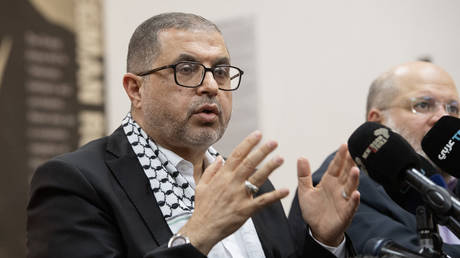 ‘Russia is very important for protecting Palestinians’: Top Hamas official talks to RT about the conflict with Israel
‘Russia is very important for protecting Palestinians’: Top Hamas official talks to RT about the conflict with Israel
Liwa Abu al-Fadhal al-Abbas (LAFA)
The Al-Abbas Brigade is closely linked to the Syrian Republican Guard and was named after Abbas ibn Ali – the son of the Shiite Imam Ali. The brigade was formed in 2012 with a specific goal – to ensure the safety of the Sayyida Zeinab mosque in Damascus and other holy sites in Syria revered by Shiites.
Reliable sources claim that the brigade is divided into smaller groups, named after the 12 Shiite Imams, and consists mainly of Iraqi, Lebanese, and Syrian Shiites. Initially, there were about 500 fighters, but in 2013 the number of volunteers increased to 10,000. All fighters completed a 45-day training course in Iran, during which they were trained to use weapons such as grenade launchers, Kalashnikov assault rifles, and sniper rifles.
The Fatemiyoun Brigade
This group was officially formed in 2014. It mainly includes Shiites from Afghanistan, known as the Hazaras (which make up around 10% of the country’s overall population). The fighters are recruited from among the millions of Afghan refugees who live in Iran. In Afghanistan itself, the brigade is known as “Hezbollah in Afghanistan.”
In this way, Tehran recruited Afghans to protect the interests of Syria and the Syrian government, which, throughout history, has been loyal to the Islamic Republic. According to certain information, the Fatemiyoun Brigade is mostly made up of the Army of Muhammad – a Shiite militant group formed during the Soviet-Afghan war. These militants had also fought against the Taliban. The brigade is divided into smaller units. For example, the group includes the Abuzar Brigade, which consists entirely of Afghan militants.
According to the US Institute of Peace (USIP), Fatimiyoun militants are generally between 17 and 35 years old. Shiism isn’t the only motivation for joining the brigade – many fighters face economic problems and are vulnerable due to their migrant status. The report says the militants are often recruited from the same village or workplace – this encourages them to watch over each other and operate more effectively at the front.
The Fatimiyoun Brigade under the command of IRGC officers took part in Assad’s offensives. It fought in the Syrian cities of Homs, Aleppo, Deir ez-Zor and Idlib. The brigades possess modern Russian T-90 tanks. According to various sources, they have between 10,000 and 20,000 fighters. However, this information dates back to 2017, since Iran reduced the number of fighters following the victory over IS. The youngest and oldest fighters, as well as those who violated discipline, were the first to be demobilized. Today, the brigade is no longer active, but experts believe that, if needed, Iran could call up to 40,000 trained fighters at any moment. At least 10,000 of them possess combat experience.
Read more They have defied the US, Israel, and Saudi Arabia, and promise ‘revenge.’ Who are the Houthis of Yemen?
They have defied the US, Israel, and Saudi Arabia, and promise ‘revenge.’ Who are the Houthis of Yemen?
The Zainebiyoun Brigade
This group mostly includes Pakistani Shiites (from the Kurram and Balochistan regions). The name of the unit refers to the main Shiite shrine in Damascus, which was barbarically attacked by IS militants in 2013. After this incident, the region started actively mobilizing Shiite militants. The Pakistani brigade numbered between 2,000 and 5,000 fighters. It was often spotted near Damascus, as well as near Aleppo and Idlib, and has participated in the Syrian Army’s offensives. The IRGC was also responsible for the training and financing of the Zainebiyoun Brigade.
Paradoxically, experts believe that the brigade is one of the least known and poorly studied Shiite armed groups that operated in Syria under Iranian command.
One of the last Pakistani Shiites to die in Syria was Zaki Mohammad Abbas. He was buried in the city of Qom in Iran, which the Shiites consider holy. Little is known about Abbas – his name may be a pseudonym, and his place and year of birth, occupation, as well as the location and circumstances of his death in Syria remain unknown.
In an interview with Panjereh on June 23, 2016, Zainebiyoun’s chief commander, Seyyed Abbas Mousavi, stated that the main reason for the group’s mobilization was the threat to Shiite pilgrimage sites in Syria. He said that Pakistani Shiites wanted to “rush to the defense of the shrines” and take part in the “apocalyptic battle against terrorists.”
According to Mousavi, “Iran is the main center and command headquarters of this war.” The commander also said Pakistani Shiites had written a letter to Supreme Leader Ayatollah Ali Khamenei, asking for permission to fight in Syria, to which Khamenei verbally replied: “Those who are able to fulfill their duty should do so to the best of their ability.”
Several sources claim that the Zainebiyoun Brigade is under the direct command of the IRGC.
Yemen’s Houthis
Until last year, few people talked about the Yemeni fighters from Ansar Allah. But things changed when they rose up against the US and its allies. The Houthi group was the only force in the region that dared to tell the truth about the events in Palestine and stood up for the Palestinians. On January 12, 2024, the US and UK attacked the positions of the Houthis in Yemen. This strike was a response to the blockade imposed by the Houthis on Israeli ships (as well as ships heading to and from Israel) in the Red Sea.
The Houthis are also called “Iran’s proxies,” and it is believed that Iran has transferred modern drones and missiles to Ansar Allah, which made it possible for the group to attack deep-sea targets and modern ships. However, the Houthis are a lot more independent than, for example, Iraq’s militia brigades or Hezbollah. There is no evidence that they are dependent on Iranian aid or under Tehran’s direct influence.
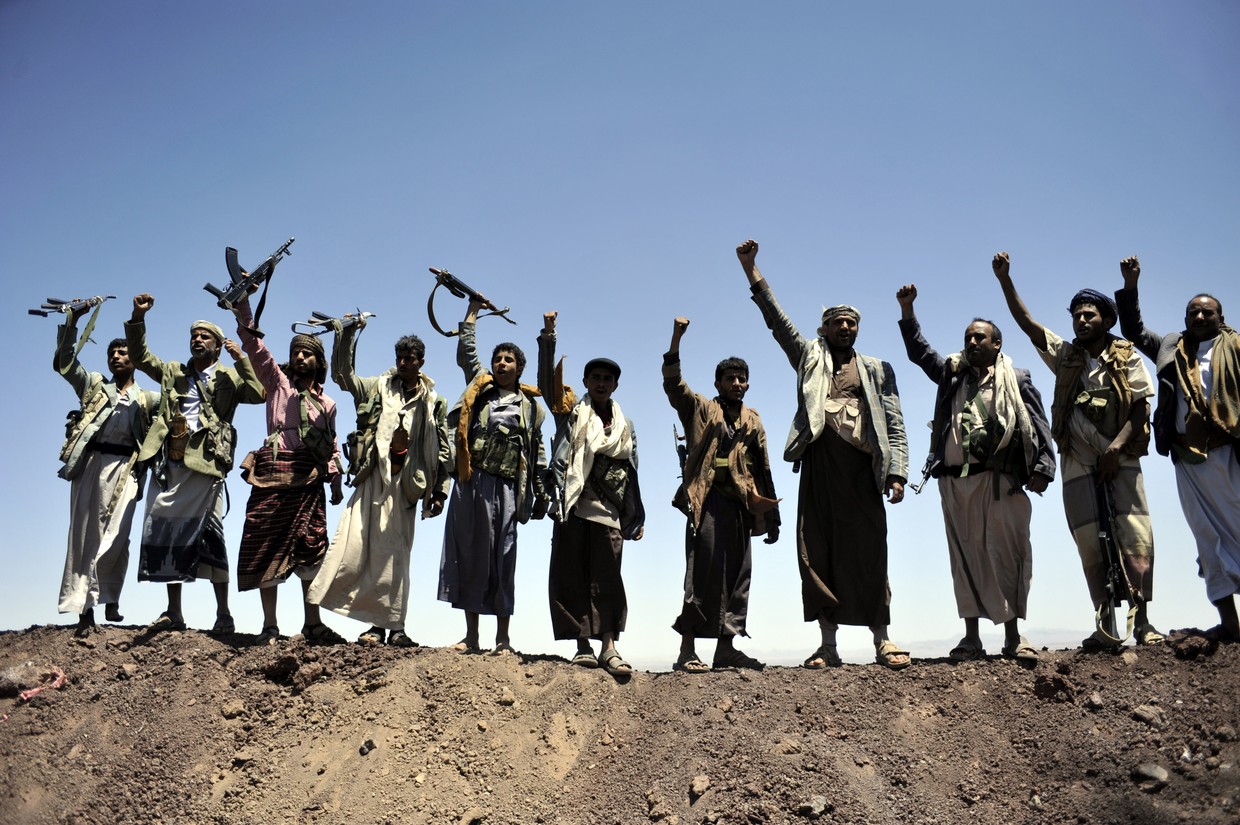 FILE PHOTO: Houthi militants after they captured the headquarters of the Sixth Military Zone following rough clashes with Yemeni government forces in northern Sanaa, Yemen.
© Mohammed Hamoud / Anadolu Agency / Getty Images
FILE PHOTO: Houthi militants after they captured the headquarters of the Sixth Military Zone following rough clashes with Yemeni government forces in northern Sanaa, Yemen.
© Mohammed Hamoud / Anadolu Agency / Getty Images
Ansar Allah’s cooperation with Iran resembles a union formed on the basis of ideological and religious affinity. However, the Houthis have their own understanding of the situation in the region, as well as their own goals and methods, which we wrote about in detail in an earlier article.
Chaos has reigned in Yemen since the unification of South Yemen and North Yemen in 1990. The latest conflict began with a dispute between the Sunnis and Shiites in 2004. In Saada, a city in northwestern Yemen, the Shiites spoke out against the Sunni authorities, whom they accused of religious oppression and corruption. Naturally, Iran supported the Shiites. As a result, the religious minority demanded independence and an armed uprising began, which was headed by Hussein Badreddin al-Houthi, who was killed in late 2004. The fighters are called “Houthis” in his honor, but officially, the movement is called Ansar Allah (“Supporters of God”).
Read more ‘You become a traitor and a bad Jew’: Israeli anti-war activists speak to RT about their country’s actions
‘You become a traitor and a bad Jew’: Israeli anti-war activists speak to RT about their country’s actions
After Hussein’s death, his brother Abdul-Malik al-Houthi took over as the movement’s leader and the fighting continued. Yemen’s authorities called the Houthis a “pro-Iranian fifth column.” In response, the movement accused Yemen’s political establishment of treason and said it served the interests of Saudi Arabia’s Wahhabi religious movement. Today, we may assume that Iran and Yemen are closely tied, united by their common goal of fighting against the US and Israel. In this regard, the Houthis are also an important part of the Axis of Resistance.
Conclusion
Tehran resorts to a revolutionary approach in its foreign policy in order to improve its positions in the Middle East. This has transformed it from a peripheral power that barely survived the eight-year war with Iraq into a regional superpower with global ambitions.
Iran’s success in Iraq, Lebanon, Syria, and Yemen is a result of its long-standing support for the region’s main political forces. Moreover, Iran has a deep understanding of the cultural characteristics of those countries where the Shiites make up either the majority, or the socially and politically important part of the population.
As for Iraq, Syria, and Lebanon, we must also note the economic ties between these nations and Iran. Iraq and Iran are involved in cultural exchange – for example, Shiite scholars and religious pilgrims regularly travel between the two countries. This allows the two nations which were once at war to grow closer to each other.
Iran not only engages in the policy of exporting the Islamic Revolution, but also protects the interests of the Shiites and acts as a guarantor of their security. Iran has proven that it does not withdraw when it comes to war. At the same time, Iran promotes the pro-Palestinian agenda and the liberation of Jerusalem, which makes it popular among many Sunnis in the region.
As of today, Iran and the Axis of Resistance coalition which it heads are the only forces in the region that are ready to confront the US. Meanwhile, the Americans are losing their authority in the Middle East and becoming more despised by the local population.
-
Site: RT - News
New legislation under the pact would reportedly allow for naval facilities to store radioactive material from submarines
Australia is in danger of becoming a “poison portal” for international radioactive waste under the three-way AUKUS pact, The Guardian reported on Monday, citing a parliamentary inquiry.
AUKUS was established in 2021 between the US, the UK and Australia in part to facilitate the transfer of military technology among the three allies, with the American military pledging to help Canberra obtain nuclear-powered submarines.
However, according to the Guardian report, new laws to establish a safety framework for Australia’s planned nuclear-powered submarines could also allow the US and UK to send waste there. Both the US and the UK are reportedly struggling to deal with their own waste due to a lack of long-term, high-level waste facilities.
Canberra introduced the Australian naval nuclear power safety bill in November of last year. If passed, it will establish a nuclear safety watchdog and allow for naval nuclear propulsion facilities to be created, including for storing or disposing of radioactive waste from AUKUS submarines.
A second bill to enable the regulator to issue licenses was introduced at the same time. Both have been referred to a Senate inquiry, which is due to report later this month, according to the report.
Read more China issues nuclear warning over AUKUS pact
China issues nuclear warning over AUKUS pact
The issue of waste disposal was “highly disturbing,” according to Dave Sweeney, the Australian Conservation Foundation’s nuclear-free campaigner. He suggested that the AUKUS partners could see Australia as “a little bit of a radioactive terra nullius.”
This is the case “especially when it’s viewed in the context of the contested and still unresolved issue of domestic intermediate-level waste management, the clear failure of our AUKUS partners to manage their own naval waste, the potential for this bill to be a poison portal to international waste, and the failure of defense to effectively address existing waste streams, most noticeably PFAS [toxic per- and polyfluoroalkyl substances],” Sweeney argued.
Australian Defense Minister Richard Marles has previously accused the Greens of “fearmongering” over similar radioactive waste-related concerns, The Guardian wrote. Marles reportedly claimed that the government would not accept waste from the other nations.
According to a recent Politico report, the AUKUS security partnership could be expanded by the end of the year to include Canada and Japan. India, New Zealand, and South Korea have also been floated as potential members.
The AUKUS partners maintain that the bloc is not a formal military alliance and is solely focused on technology sharing. Meanwhile, China has condemned the project as an attempt to build an “Asia-Pacific version of NATO,” warning that it would kick off an “arms race” in the Indo-Pacific.
-
Site: RT - News
Thomas Bach has been interviewed by notorious pranksters Vovan and Lexus
International Olympic Committee (IOC) President Thomas Bach has admitted to a pair of pranksters that Ukrainians have been asked to spy on Russian athletes online so that they could be banned from the upcoming Paris Games.
In a video-call posted on Tuesday, in which one of the Russian duo known as Vovan and Lexus impersonated an African official, Bach claimed that by sanctioning Russian athletes, the IOC is “punishing those who are responsible for the annexation.”
The IOC chief was apparently referring to the former Ukrainian regions of Donetsk, Lugansk, Kherson and Zaporozhye, which overwhelmingly voted to join Russia in public referenda in 2022. They followed the Crimean Peninsula, which did the same in 2014 after a Western-backed coup in Kiev.
“No Russian anthem can be played and no Russian flag can be raised [at the Paris 2024 Olympics],” the IOC president stated.
Answering a question on whether Russian athletes who support the Ukraine conflict deserved the right to take part in the Olympics, Bach revealed that the IOC has a special commission which monitors public statements by athletes in support of the government in Moscow.
“We have a special supervisory commission together with an independent company which is monitoring the internet, the media, and public declarations,” he stated.
“We also offered the Ukrainian side – and not only offered, but also asked to provide us with their knowledge about the behavior of such athletes or officials,” Bach further revealed.
He stressed that any athletes found to have expressed support for the Russian government will be banned from the Olympics.
Read more Olympic legend tells Russians to participate in Paris games
Olympic legend tells Russians to participate in Paris games
Russian athletes are allowed to participate in the Games as neutrals in individual sports, but are barred from team events.
After the start of the Ukraine conflict in February 2022, the IOC recommended that athletes from Russia and its close ally Belarus should not be allowed to compete in international events. In December last year, the body ruled that a limited number of people from the two countries could participate in the Olympics as AINs (individual neutral athletes).
In March, the international body announced that the maximum number of Russians who could qualify for the Paris Games was 55, while Belarus is limited to 28 athletes. However, according to IOC director James Macleod, the two nations are unlikely to meet the quotas, and around 36 Russian and 22 Belarusian athletes are expected to make it to the Games.
Several top-ranking European officials, including Latvian Foreign Minister Krisjanis Karins and Italian Prime Minister Giorgia Meloni, have fallen for prank calls by Russian duo Vovan and Lexus in recent months, during which the politicians revealed their thoughts on sensitive topics such as the Ukraine conflict.
-
Site: RT - News
Nearly one-third of cabinet members resigned abruptly on Monday
Peruvian President Dina Boluarte replaced six ministers on Monday after they resigned abruptly as she faces a corruption probe related to her ownership of luxury watches, media reported on Tuesday.
The resignations follow a probe launched into allegations of illicit enrichment by the Peruvian leader, who is being investigated over her high-end Rolex watches, as authorities suspect corruption.
Boluarte is being preliminarily investigated for possessing an undisclosed collection of luxury watches since she came to power in July 2021 as vice president and social inclusion minister, and then as president in December 2022.
Police and prosecutors gained entry to the president’s residence in Lima on Friday night with a sledgehammer in a raid authorized by the judiciary at the request of the attorney general’s office. Investigators were reportedly searching for evidence regarding the origin of at least three Rolex watches. Boluarte has denied the accusations and insists that she purchased the watches with her own money.
The cabinet reshuffle came as lawmakers from various parties, including Peru Libre to which Boluarte once belonged, submitted to parliament a request to remove the president from office for “permanent moral incapacity.”
Read more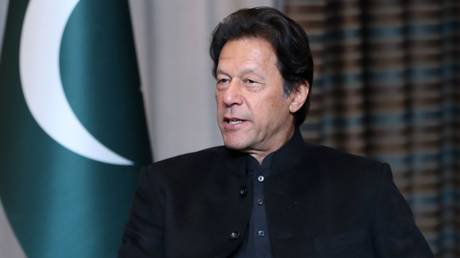 Imran Khan’s jail sentence suspended
Imran Khan’s jail sentence suspended
Interior Minister Victor Torres was among the six ministers who announced their resignation.
“I’m leaving in peace with my hands clean,” Torres told reporters, adding: “I am leaving because I asked the lady and she accepted.” While he claimed to have stepped down due to “family and health issues,” some media speculated that the resignation was meant as punishment for the weekend raids.
The five other cabinet ministers who resigned had held the ministries for women’s issues, education, rural development, production, and foreign trade. They reportedly voiced support for Boluarte, with one describing the raid on her home as “unnecessary” and “excessive.”
On Monday evening, the Peruvian leader named six new ministers, replacing roughly a third of her 19-person cabinet in a single day.
The slew of resignations has increased the volatility of Peru’s political landscape, which has seen six different presidents in merely eight years.
-
Site: RT - News
Multiple victims and the suspect are all 12 years old, according to the police
A student has been killed and two others injured in a school shooting near the Finnish capital Helsinki, local police have reported, adding that the victims and the suspected perpetrator are all 12 years old.
The incident happened on Tuesday morning at a lower secondary school in the city of Vantaa, just to the north of Helsinki. Police said they had been alerted to the shooting just after 9am and arrested a suspect in the capital soon afterwards.
One student died at the scene while two others were rushed to hospital, according to an update from law enforcement issued several hours after the shooting. Initial reports said three students had been injured.
The unnamed suspect is a student at the school and had a handgun in their possession. Officers seized the weapon and took the apparent shooter into custody.
According to the Ilta-Sanomat newspaper, law enforcement initially stated the age of the victims as 13, but later corrected that information. Students and teachers at the facility had been told by officers to take shelter and await instructions, the report added. Further updates are expected later on Tuesday.
-
Site: RT - News
Israeli Prime Minister Benjamin Netanyahu has confirmed that IDF was responsible for the attack, but insisted it was an accident
Seven aid workers, including four foreigners, providing meals for the World Central Kitchen (WCK) have been killed in a “targeted attack” by Israeli forces in Gaza, the NGO, founded by Spanish-American celebrity chef Jose Andres, has said.
All of the group’s operations in the Palestinian enclave have been suspended following the Monday incident, it added.
Five fatalities were reported initially as a result of the airstrike, but WCK announced an updated death toll in a statement on Tuesday. The victims include a dual US-Canadian citizen, three Palestinians, an Australian, a Pole and a British national, the group said.
According to the NGO, its staff members were attacked in the town of Deir al-Balah in central Gaza as they were leaving a warehouse after unloading tons of food aid earlier delivered to the Palestinian enclave by sea.
The aid workers were traveling through a de-conflicted zone in two armored cars with the WCK logo on them as well as a soft skin vehicle, the NGO said. The convoy was struck despite WCK coordinating its movements with the Israel Defense Forces (IDF), the statement read.
“This is not only an attack against WCK, this is an attack on humanitarian organizations showing up in the most dire of situations, where food is being used as a weapon of war. This is unforgivable,” WCK CEO Erin Gore said.
Read more UK govt lawyers conclude Israel in breach of humanitarian law – media
UK govt lawyers conclude Israel in breach of humanitarian law – media
Videos from the scene of the attack show the bodies of several people in World Central Kitchen vests. British, Polish and Australian passports were also seen in the clips.
Andres wrote on X (formerly Twitter) that he was “heartbroken” by what had happened. The Michelin-starred chef urged the Israeli government to stop its “indiscriminate killing,” restriction of humanitarian aid and “using food as a weapon” in Gaza.Australia has confirmed that one of its citizens was killed in the IDF strike, with the country’s Prime Minister Anthony Albanese saying that Canberra “expects full accountability for the deaths of aid workers, which is completely unacceptable.”
US National Security Council spokeswoman Adrienne Watson wrote on X that Washington was “deeply troubled” by the deaths of the WCK staff. “We urge Israel to swiftly investigate what happened,” Watson said.
Israeli Prime Minister Benjamin Netanyahu has acknowledged that the IDF was behind the airstrike that killed the aid workers, but is insisting that it was an accident.
“Unfortunately, in the last 24 hours there was a tragic case of our forces unintentionally hitting innocent people in the Gaza Strip,” he said on Tuesday, speaking from a hospital where he underwent a surgery for hernia.
“It happens in war,” Netanyahu said of the incident, promising that it will be thoroughly investigated. “We will do everything so that this thing does not happen again,” the PM added.
READ MORE: Netanyahu approves ‘operational plan’ to attack Rafah in Gaza
The UN Palestinian refugee agency (UNRWA) said last month that 165 of its workers have been killed since October 7, when the IDF began its attacks on Gaza in response to an incursion into Israel by Hamas, in which at least 1,200 were killed and 250 taken hostage. The death toll from Israel’s airstrikes and ground offensive in Gaza has already reached 32,845 people, according to the enclave's health ministry.
-
Site: RT - News
The Knesset has allowed the government to suspend the broadcast of foreign TV channels on security grounds
The Israeli government will ban Al Jazeera, Prime Minister Benjamin Netanyahu said on Monday, labeling the Qatar-based pan-Arab network a mouthpiece of Hamas. The statement came almost six months into Israel’s war in Gaza.
On Monday, the Knesset passed a temporary law allowing the prime minister to ban a foreign channel and shut down its offices if it is deemed a threat to national security. Netanyahu, who is recovering from hernia surgery, said he plans to use the law against Al Jazeera.
“Al Jazeera has harmed Israel’s security, actively participated in the October 7 massacre, and incited against Israeli soldiers. It is time to remove the bullhorn of Hamas from our country,” Netanyahu wrote on X (formerly Twitter) on Monday.
“The terrorist channel Al Jazeera will no longer broadcast from Israel. I intend to act immediately in accordance with the new law to stop the channel’s activity.”
Communications Minister Shlomo Karhi said the channel will be blocked “in the coming days,” adding that “there won’t be freedom of expression for Hamas mouthpieces,” according to the Times of Israel. The legislation will remain in force until July 31, 2024, or until the end of “significant military actions” in the war with Hamas, the Knesset said.
Al Jazeera released a statement, saying that it “holds the Israeli prime minister responsible for the safety of its staff and network premises around the world, following his incitement and this false accusation. The channel said that “such slanderous accusations will not deter us from continuing our bold and professional coverage,” and threatened legal action.
Read more Does Biden want Netanyahu gone?
Does Biden want Netanyahu gone?
Some Israeli legislators have opposed the law. MK Mansour Abbas argued that Al Jazeera should be allowed to broadcast because it “gives a platform to speakers from Israel, even to military spokespersons.”
The US also voiced concerns about the new law. “We believe in the freedom of the press … and that includes those who are reporting in the conflict in Gaza. So we believe that work is important,” White House spokeswoman Karine Jean-Pierre told reporters.
Al Jazeera correspondent Shireen Abu Akleh was killed while covering an Israeli raid in the West Bank in 2022. In December, Samer Abudaqa, a cameraman working for the channel, was killed during the IDF operation in Gaza. Al Jazeera blamed the Israeli army for both deaths.
Israel declared war on Hamas after the Palestinian militants carried out a surprise cross-border raid on October 7, killing some 1,100 people and taking more than 200 hostages. Dozens of captives were subsequently released through prisoner swaps during a weeklong ceasefire in November.
More than 30,000 Palestinians have been killed since October 7, according to the Hamas-run Health Service in Gaza.
-
Site: RT - News
Iran has said it will take “countermeasures” against the US and Israel over the recent airstrike in Syria
Iran has vowed to retaliate against Israel and the US in response to an airstrike in Syria which killed a group of Tehran’s senior commanders.
The Islamic Revolutionary Guard Corps (IRGC) confirmed that seven officers, including brigadier generals Mohammad Reza Zahedi and Mohammad Hadi Haji Rahimi, were killed in the airstrike on the Iranian consulate building in Damascus on Monday. Zahedi was a senior commander with the Quds Force – the IRGC unit tasked with operations overseas – and Rahimi was his deputy.
Officials in Syria and Iran have blamed Israel for the attack. “The Islamic Republic of Iran, while reserving its rights to take countermeasures, decides on the type of reaction and punishment of the aggressor,” Foreign Ministry spokesman Nasser Kanaani said in a statement quoted by the IRNA news agency.
Foreign Minister Hossein Amir-Abdollahian warned on X (formerly Twitter) that Israel’s close ally the US “must be held accountable.”
Read more Israel kills top Iranian general
Israel kills top Iranian general
Israel has not commented on the strike. The Israeli government rarely publicly acknowledges airstrikes in Syria, which Damascus has repeatedly denounced as violations of its sovereignty.
The Jewish state has accused Iran of masterminding the deadly October 7 attack on Israeli citizens, which kickstarted the ongoing war with the Palestinian militant group Hamas. Last month, the Israel Defense Forces (IDF) struck what it said were Iran-linked militants in Lebanon.
Tehran has pledged to continue its support for Hamas and other Palestinian groups, but insisted that Hamas had independently decided to invade Israeli territory.
-
Site: RT - News
The US president seemed to disavow the highly controversial move just a day after making it
US President Joe Biden has rejected criticism over his annual proclamation of March 31 as Transgender Visibility Day, which this year coincided with Easter Sunday. His ambiguous remarks on the matter, however, were perceived by his critics as a flat denial of the move he had made just a day before.
Biden was pressed on the matter by reporters and asked about the criticism, voiced by Republican House Speaker Mike Johnson, who called the step “outrageous and abhorrent’ tradition-busting moves.”
The president stated the speaker was “thoroughly uninformed” on the matter, producing what appeared to be a flat denial to a follow-up question on how exactly Johnson was “uninformed.”
I didn’t do that.
The remarks re-ignited the criticism, with Johnson taking to X (formerly Twitter) to poke fun at the president and posting a screenshot of Biden’s proclamation of March 31 as the Transgender Day of Visibility.
“This you, Joe Biden?” the speaker wrote.
This you, @JoeBiden? https://t.co/p7zmhlhQLm pic.twitter.com/ZIT6v7tiHO
— Speaker Mike Johnson (@SpeakerJohnson) April 1, 2024Some, however, translated the president’s remarks as an attempt to explain that he was not the one to introduce the tradition in the first place, rather than a denial of his own move.
The proclamation dates back to 2009, when then-President Barak Obama introduced it shortly after assuming office, marking March 31 as Transgender Visibility Day. The date will not coincide with Easter Sunday for decades to come.
Read more Biden proclaims Transgender Day of Visibility on Easter Sunday
Biden proclaims Transgender Day of Visibility on Easter Sunday
The White House appeared to back this position as well, with Press Secretary Karine Jean-Pierre insisting any backlash over the president’s move was “misinformation.”
“So surprised by the misinformation that’s been out there around this and I want to be very clear: every year for the past several years on March 31, Transgender Day of Visibility is marked,” she stated, adding that the nature of the situation was evident “for folks who understand the calendar and how it works.”
“Easter falls on different Sundays, right, every year, and this year it happened to coincide with Transgender Visibility Day. And so that is the simple fact. That is what has happened. That is where we are,” she explained.
Still, the affair has triggered a storm of criticism from prominent Christians and conservatives alike, getting further aggravated by the fact that the Biden administration has opted to ban children participating in the Easter Egg design contest from using religiously themed designs.
-
Site: RT - News
A ‘rally around the flag’ effect could disarm the populist surge, Charles Sapin has suggested
With polls showing ‘nationalist’ parties surging in popularity ahead of the upcoming European Parliament election, Kiev’s worsening situation could prove useful to the bloc’s powers that be, according to a new book by French investigative journalist Charles Sapin.
Most of the EU has been outspoken in supporting the Ukrainian government in the conflict with Russia, sending an estimated €77 billion ($83 billion) worth of weapons, equipment, ammunition and even cash to Kiev. Sapin’s analysis, however, implies that bad news from the battlefield could bolster the European People’s Party (EPP) and the second-largest group, the Progressive Alliance of Socialists and Democrats (S&D) in upcoming elections.
“If Ukraine’s position weakens, there may be a ‘rallying behind the flag effect’ more favorable to the forces in place,” he was quoted as saying by Politico EU on Monday.
Sapin is a reporter for the weekly Le Point who spent six years researching what he calls the “nationalist” parties that form the Identity and Democracy (ID) bloc in the European parliament – such as Hungary’s Fidesz, Portugal’s Chega, Spain’s Vox, France’s National Rally, Brothers of Italy and the Sweden Democrats. The final result was the book called ‘Les Moissons de la Colere’ (The Harvests of Wrath), presented as a deep dive into “nationalist Europe.”
One major weakness of the parties in the ID grouping, according to Sapin, is that they have different opinions on the Ukraine conflict.
Nationalists’ numbers might be rising but they are “isolated” in Brussels because of their particularism, he contends. Their victories in the upcoming election would move the needle to the right, but to the benefit of the EPP, currently the majority group.
Read more EU prosecutors take up Von der Leyen corruption probe – Politico
EU prosecutors take up Von der Leyen corruption probe – Politico
This may help explain why French President Emmanuel Macron brought up Ukraine at a recent brainstorming session about the upcoming elections. Amid the strategy discussions the French leader suddenly voiced a concern that Ukraine “could fall very quickly,” according to sources that spoke with Politico. He then set up a 'New Europeans' coalition, an alliance of liberal parties from France, Denmark, Poland, Romania and Slovenia.
Hungarian Prime Minister Viktor Orban – long the sole dissenter when it came to aiding Kiev – doubled down on calls for a ceasefire in Ukraine and a negotiated peace.
According to Sapin, parties like Orban’s have gained power thanks to semantic tricks and ideological acrobatics, converting “old bourgeois” voters by talking about immigration, identity and the environment and abandoning calls for leaving the EU. His book includes insights from both the closest political advisers to Orban, from Italian PM Giorgia Meloni and French presidential candidate Marine Le Pen – and from their political enemies.
-
Site: RT - News
The former prime minister of Pakistan had been sentenced to a 14-year term for illegally selling state gifts
A Pakistani court on Monday granted the country’s former prime minister Imran Khan leave to appeal his conviction for graft and suspended his 14-year jail sentence, according to Reuters, citing his lawyer.
Khan and his wife Bushra Bibi were each handed a 14-year sentence on January 31 – just a week ahead of Pakistan’s February 8 elections, which Khan’s party alleges were rigged. Khan has been in prison since August last year on several charges.
According to his lawyer, Barrister Ali Zafar, the Islamabad High Court said the couple’s sentences for corruption will remain suspended until a final decision on the convictions.
“No evidence backs up this conviction,” he told reporters, claiming that was the reason why the court suspended the sentence on first hearing of the appeal.
Khan and his wife were charged with unlawfully selling state gifts, worth more than 140 million rupees ($500,000), while Khan was prime minister from 2018 to 2022. A list of these gifts reportedly included perfumes, diamond jewelry, dinner sets, and seven watches, mostly Rolexes.
Despite the suspension, 71-year-old Khan will remain in jail on multiple other sentences imposed on the politician ahead of the polls, and which also disqualified him from holding any public office for ten years.
Read more Pakistan elects new prime minister
Pakistan elects new prime minister
In another such prosecution, the former PM was given ten years in prison for leaking state secrets. Khan claimed that the cable he released contained evidence of collusion between the Pakistani military and US officials to have him removed from power in April 2022.
A former cricketer-turned-politician, Khan was ousted in a no-confidence vote in 2022, with the opposition accusing him of mismanaging the economy and foreign policy. Since then, the former leader has fought dozens of legal battles.
Khan repeatedly denied the allegations and claimed that he was overthrown as a result of a conspiracy. His Tehreek-e-Insaf party (PTI) also maintained that the cases were based on made-up charges to keep him out of politics. The PTI was barred from the election, forcing its candidates to run as independents.
On March 3, Pakistan’s newly formed government elected Shehbaz Sharif, who heads the country’s Muslim League-Nawaz (PML-N) party, as prime minister, following a general election. The vote took place amid protests by Khan’s supporters, who insist the election was a sham. This is the second term for Sharif, who was first elected prime minister in April 2022, after Khan was ousted in the no-confidence vote.
-
Site: RT - News
Police have reportedly found proof that 57-year-old Zebah Abdel Salem Haniyeh had links to ‘serious security offenses’
Israeli security forces on Monday arrested the sister of Hamas leader Ismail Haniyeh on incitement-of-terrorism charges, according to media reports that cited police.
Officers reportedly claim to have found documents, telephones, and other items through which 57-year-old Zebah Abdel Salem Haniyeh – an Israeli citizen – is linked to “serious offenses against Israel.”
The police initially did not identify the suspect, saying only that she was a resident of the southern town of Tel Sheva, where the raid took place on Monday morning. However, according to The Times of Israel, defense sources, speaking on condition of anonymity, confirmed that the woman is one of Haniyeh’s sisters.
The operation, dubbed ‘Early Dawn,’ was reportedly a multi-department effort, with police, border officers, the IDF, and Israeli Police’s aerial unit all taking part in the raid.
Israeli Southern District Commander Superintendent Amir Cohen was cited as commenting on the arrest operation that no effort would be spared in the war against terrorism and that every asset available would be used to ensure peace and security for Israeli citizens.
Later on Monday, some Israeli media reported that Haniyeh would be detained until April 4.
The reports of the arrest come as Israel continues to wage war against Hamas in Gaza. Israeli Prime Minister Benjamin Netanyahu has vowed to eliminate the Palestinian militant group, after it staged a deadly incursion into Israel last October, in which some 1,200 people were killed and scores taken hostage. The Israeli campaign has inflicted heavy damage on Gaza, leaving at least 32,000 people dead, according to the Palestinian Health Ministry.
On Sunday, Netanyahu reiterated his resolve to achieve a “victory,” revealing that he had already approved an “operational plan” for a renewed push into the southern Gaza city of Rafah.
-
Site: RT - News
Despite his deep and long-standing ties with American politics, the Israeli PM seems to have fallen out of favor in Washington
Since the attack by militarized groups affiliated with the Palestinian movement Hamas on Israel on October 7, and the subsequent conflict in Gaza, special attention from the media has been drawn to the transformation of relations between Israeli Prime Minister Benjamin Netanyahu and the administration of US President Joseph Biden.
For experts analyzing the relationship between Netanyahu and the US authorities in historical retrospect, the current “cooling” did not come as a particular surprise. It would be useful to examine Netanyahu’s biography and political career, which is closely linked to the US.
American boy Ben Nitay
Benjamin Netanyahu, a dominant figure in Israeli politics, has had a career marked by resilience, controversy, and strategic acumen. As the longest-serving Israeli prime minister, Netanyahu’s political journey encompasses several terms in office, starting from 1996 to 1999 and then from 2009 onwards, with his leadership persisting through various coalitions and political climates.
Netanyahu was born in 1949 in Tel Aviv. His mother, Tzila Segal (1912–2000), was born in Jerusalem, and his father, Warsaw native Benzion Netanyahu (Mileikowsky; 1910–2012), was a historian specializing in the Jewish Golden Age in Spain. His paternal grandfather, Nathan Mileikowsky, was a rabbi and Zionist writer. The activities of his grandfather and father had a significant influence on the formation of Netanyahu’s nationalist ideas.
Between 1956 and 1958, and then from 1963 to 1967, his family lived in the US in Cheltenham Township, Pennsylvania, a suburb of Philadelphia, while his father, Benzion Netanyahu, taught at Dropsie College. After finishing high school in 1967, Netanyahu returned to Israel to enlist in the Israel Defense Forces (IDF), during which time he participated in a series of military operations and was wounded multiple times. In 1972, he completed his service and was discharged.
Read more ‘Russia is very important for protecting Palestinians’: Top Hamas official talks to RT about the conflict with Israel
‘Russia is very important for protecting Palestinians’: Top Hamas official talks to RT about the conflict with Israel
Netanyahu returned to the US at the end of that same year to study architecture at the Massachusetts Institute of Technology (MIT). After a brief return to Israel to participate in the Yom Kippur War, he went back to the US and, under the name Ben Nitay, earned a Bachelor of Science degree in architecture in February 1975, followed by a Master of Science degree from the Sloan School of Management at MIT in June 1976.
Simultaneously, he pursued a Ph.D. in political science until his studies were interrupted by the tragic news of his brother’s death in the same year, who had participated in the Entebbe raid, an anti-terrorist operation to free hostages taken on a flight from Tel Aviv to Paris in Uganda. Netanyahu’s close circle noted that the years of service in the IDF and then the death of his brother further hardened his position regarding the Palestinian issue.
After spending a few months in Israel, ‘Bibi’ returned to the US again and started working as an economic consultant for the Boston Consulting Group, where he met and befriended Mitt Romney, a Republican politician who would later serve as the Massachusetts governor, run against Barack Obama in the 2012 presidential election, and then become the junior senator from Utah in 2019.
Thus, it can be noted that before starting out in Israeli politics, Netanyahu had formed a significant career and connections in the US, which later determined the priority directions of his foreign policy.
The rise of a young politician
In 1978, Netanyahu returned to Israel. From 1978 to 1980, he led the Jonathan Netanyahu Anti-Terrorism Institute (named after his late brother), a non-governmental organization focused on the study of terrorism. From 1980 to 1982, he was the marketing director of Rim Industries in Jerusalem. During this period, he established his first connections with several Israeli politicians, including Moshe Arens. In 1982, Arens became the Israeli ambassador to the US and took Netanyahu with him to Washington as his deputy. From 1984 to 1988, Netanyahu served as the Israeli ambassador to the UN.
In 1988, Netanyahu returned to Israel and was elected to the Knesset as a member of the Likud party. He quickly rose through the party ranks, holding several ministerial positions, including deputy minister of foreign affairs.
In 1996, Netanyahu became the youngest person ever to hold the post of prime minister of Israel, after defeating Shimon Peres in highly competitive elections. His first term was marked by a tough stance on security issues and a cautious approach to the peace process with the Palestinians, despite signing the Hebron and Wye River agreements, which facilitated the implementation of the Oslo Accords.
After losing the 1999 election to Ehud Barak and taking a brief break from political leadership, Netanyahu returned with renewed force. He served as minister of foreign affairs and minister of finance in Ariel Sharon’s government, advocating for economic reforms and a hard line against the Palestinian intifada.
Netanyahu’s political resilience was fully demonstrated when he regained the Likud leadership and then the prime minister’s office in 2009. He then served several consecutive terms until June 2021, leading Israel through numerous challenges, including security threats, diplomatic isolation, and internal issues.
Netanyahu’s tenure has been characterized by a hard stance on security issues, particularly regarding Iran and its nuclear program, as well as a firm policy on combating terrorism. His government expanded Israeli settlements in the West Bank, leading to international criticism and tension with the Palestinians. Domestically, Netanyahu has championed a neoliberal economic policy, which spurred economic growth but also increased social inequality.
He faced numerous corruption charges, leading to widespread protests and calls for his resignation. Despite these challenges, Netanyahu has proven to be a political survivor, using his diplomatic skills, media experience, and a deep understanding of Israeli society to maintain his power.
He returned to lead the country’s government in December 2022. But this time, he decided to consolidate his power and initiated a legal reform at the beginning of 2023. This move has sparked significant controversy and protests in Israeli society. The reform involves a series of changes in the Israeli judicial system, which supporters explain as necessary to strengthen democratic principles and the balance of powers, while critics see it as a threat to democracy and the independence of the judicial system.
The cataclysms of Bibi’s relations with American authorities
Netanyahu’s relations with the US have been and remain a central aspect of his political career, reflecting a complex interplay of diplomacy, personal relations with US leaders, and at times, contentious political disagreements. These relationships have spanned the administrations of several US presidents, from Bill Clinton to Joe Biden, and have been characterized by both close cooperation and notable frictions.
Netanyahu’s first term as prime minister (1996-1999) coincided with the presidency of Bill Clinton. The two leaders had a rocky relationship, primarily due to disagreements over the peace process with the Palestinians and Israel’s settlement policy. The US sought to advance the Oslo Agreements and was often at odds with Netanyahu’s more security-oriented approach.
Relations between Netanyahu and the US improved during George W. Bush’s presidency, especially when Netanyahu was finance minister. The Bush administration’s strong stance on combating terrorism after the September 11 attacks aligned with Netanyahu’s security policies. Moreover, Bush’s support for Israel’s right to self-defense resonated with Netanyahu’s governmental and personal philosophy.
Significant tension rose during Barack Obama’s presidency. Firstly, Bibi was displeased with Washington’s support for protest movements and state coups in the Middle East during the Arab Spring. The Israeli prime minister was convinced that the revolutions would lead to power in Arab countries falling to proponents of radical Islamist movements, which in turn would lead to problems and conflicts with his country. However, in the White House, his concerns were disregarded, and the countries’ positions on this issue were diametrically opposed.
Read more Will the ‘gates of hell’ open in the Middle East?
Will the ‘gates of hell’ open in the Middle East?
Another major point of contention was the nuclear deal with Iran (JCPOA), which Netanyahu vehemently opposed, claiming it would not prevent Tehran from developing nuclear weapons. Making an unprecedented move that underscored the depth of these disagreements, Netanyahu addressed the US Congress in 2015, criticizing the agreement – an action viewed as a direct challenge to Obama’s foreign policy and a breach of diplomatic protocol.
Donald Trump’s presidency marked a high point in US-Israel relations under Netanyahu. Trump’s decisions to recognize Jerusalem as Israel’s capital, move the US Embassy there, and acknowledge Israeli sovereignty over the Golan Heights were significant policy shifts that Netanyahu welcomed and celebrated.
This period was characterized by strong personal rapport between Netanyahu and Trump, with whom Bibi had become friends during his time as Israel’s ambassador to the UN in New York, as well as alignment on many policy issues, including a tough stance on Iran and shared skepticism toward traditional multilateral approaches to peace and security. It was under Trump that Netanyahu was able to normalize relations with several Arab countries through the Abraham Accords; it appeared that ties would be strong with Washington, and that relations with Arab countries would also improve.
Reviewing the history of Netanyahu’s relations with American authorities, one can easily discern a pattern. Bibi prefers and understands Republican presidents, whereas with Democrats, values and visions clearly clash. The logic of the relationships has not changed with the arrival of the experienced Democrat politician Joe Biden to the Oval Office.
Sworn “Friends”: Netanyahu and the Democrats
The relationship with the current Democratic administration did not start off well, as the new White House incumbent contemplated returning to the JCPOA with Iran, condemned the policy of illegal expansion of Israeli settlements on Palestinian territories, resumed funding for the UN’s Middle East agency for Palestinian refugees and works organization (UNRWA), and openly supported the two-state solution. Although Netanyahu and Biden had been closely acquainted for over four decades, their political views were very different.
After another escalation of relations between Israelis and Palestinians in May 2021 and a series of internal crises in Israel, Netanyahu was forced to “take a break,” and on June 13, 2021, the new government of Naftali Bennett and Yair Lapid was sworn in. The new authorities tried to mend relations with the Democrats, but the onset of Russia’s military operation in Ukraine prevented this. Washington demanded that everyone join the anti-Russian sanctions and isolate Moscow. Israel, like all of the US’ Middle Eastern partners in the region, did not agree.
But Netanyahu’s “break” was not long, and by December 2022, he had returned to Israel’s political Olympus, forming the most right-wing cabinet in decades. Things with Washington got even worse. Bibi and his government were condemned for their neutral stance on the Ukrainian conflict and, moreover, for the aforementioned judicial reform, which the US considered a “threat to democratic values and freedoms in Israel.” On March 20, 2023, Biden had a phone conversation with Netanyahu, during which he once again raised the significance of democracy for US-Israel relations and directly offered support in finding a compromise on the judicial reform issue.
But the crisis only deepened. After the suspension of the judicial reform, Biden told the media that Israel “can no longer go down this path” and expressed hope that the Israeli prime minister would abandon his plans. To top it off, the American president noted that he did not intend to invite Netanyahu to the White House “in the near future,” which aggravated him. The following day, Netanyahu responded: “Israel is a sovereign country that makes its decisions according to the will of its people, not based on pressure from abroad, including from the best friends.”
The events of October 7 did nothing to improve Netanyahu’s already tense relations with Washington. The Biden administration supported Israel, increasing its military presence in the region. The US House of Representatives approved a bill to allocate $14 billion in aid to Israel, and assistance in ammunition and weapons for Israel was also notably increased. However, the American authorities were extremely displeased with the IDF’s ground operation in Gaza. Multiple attempts to pressure Netanyahu and conclude a ceasefire agreement were unsuccessful. The Israeli PM disregarded all of the Biden administration’s “red lines.”
The trip of Netanyahu’s rival Benny Gantz to the US on March 4 and his negotiations with American officials were not coordinated with the PM. Many saw this as an attempt by the US to remove Netanyahu and replace him with Gantz, which only exacerbated the disagreements between the countries.
By April 7, the current conflict between Hamas and Israel will be six months old, but there’s still no resolution in sight. Washington, along with regional players Qatar and Egypt, tried to reach a ceasefire agreement before the start of the Muslim holy month of Ramadan, but all was in vain.
Read more The hunger killing Gaza’s children has a clear cause that few are willing to name out loud
The hunger killing Gaza’s children has a clear cause that few are willing to name out loud
On March 7, in a conversation with Democratic Senator Michael Bennet, Biden said, “I told Bibi: we’re going to have a ‘come to Jesus’ meeting.” In an interview with MSNBC on March 9, he explained that in the south of his home state of Delaware, the expression “come to Jesus” is used to mean “a serious meeting.” “I’ve known Bibi for 50 years, and he understood what I meant,” the US leader stated, adding that “in my view, [Netanyahu’s] doing more harm to Israel than helping it, by making the rest of the world go against what Israel stands for. And I think that’s a big mistake.”
Netanyahu responded by saying: “I don’t know what the president meant, but if he meant that I am pursuing policies against the majority of the Israeli public and that it harms Israel’s interests, then he is mistaken on both counts.” “We will go there. We will not back down from this. You know, I also have a ‘red line.’ You know what that ‘red line’ is? To ensure that October 7th never happens again. It will never happen again,” Bibi added, referring to the operation in the Palestinian city of Rafah, which Washington opposes.
In summary, it can be noted that indeed, Netanyahu’s relations with the Biden administration are deteriorating against the backdrop of the war in Gaza and global turbulence. The White House does not want to understand that Netanyahu places the interests of his government above all else, even if they conflict with American interests. Or perhaps it understands but is unwilling to make attempts to find a compromise.
Despite the current “cooling” and certain disagreements, the common strategic interests and long-term ties between the countries support a strong partnership capable of withstanding challenges and changes on the international stage. For Netanyahu himself, the US is an important and necessary partner, with whom he is intimately familiar. Moreover, many in the Israeli corridors of power anticipate a victory for Donald Trump in the November election, believing that should he return to office, relations between the countries will be mended.
-
Site: RT - News
IRGC Brigadier General Mohammad Reza Zahedi was among the dead in a Damascus airstrike
Brigadier General Mohammad Reza Zahedi of Iran’s Islamic Revolutionary Guard Corps (IRGC) has been killed in an Israeli airstrike on Damascus, Syria.
The Monday attack destroyed a building adjacent to the Iranian embassy in Damascus, killing at least six people, according to the Syrian Arab News Agency (SANA). Iranian media identified the building as the Iranian consulate and the ambassador’s residence. Iran’s Tasnim News Agency identified Zahedi, a senior commander in the IRGC’s Quds Force, as being among the dead. His deputy was reportedly killed as well.
According to a Reuters correspondent in Damascus, the consulate was “flattened,” in what was described as “a startling apparent escalation of conflict in the Middle East that would pit Israel against Iran and its allies.”
It’s now confirmed that Abou Mahdi Zahedi, Iran’s top general in Syria and Lebanon was killed along with other IRGC officers in the Israeli airstrike on the Iranian consulate in Damascus. https://t.co/uZo8QDZpo5 pic.twitter.com/AKTyMjw6UR
— Ali Hashem علي هاشم (@alihashem_tv) April 1, 2024Israel has not commented on the strike. West Jerusalem rarely acknowledges its airstrikes against Syria, which Damascus has repeatedly denounced as violations of its sovereignty.
Read more US secretly sending more bombs to Israel – WaPo
US secretly sending more bombs to Israel – WaPo
The attack on the consulate is “a breach of all international conventions,” Iranian Foreign Minister Hossein Amir-Abdollahian said in a call to his Syrian counterpart, according to Iranian media. He added that Tehran will hold Israel responsible. Iran’s ambassador to Syria said the response will be “harsh,” according to Reuters.
The Quds Force is the IRGC’s military intelligence and unconventional operations arm. Zahedi was reportedly in charge of its operations in Syria and Lebanon. Its most famous commander, General Qassem Soleimani, was assassinated in January 2020 by a US drone, while visiting Baghdad, Iraq.
Another Quds Force commander, General Razi Mousavi, was killed in Damascus last December, also by an Israeli airstrike that was not officially acknowledged.
-
Site: RT - News
The Islamic Republic of Pakistan has seen rising calls to boycott Western companies over the Gaza conflict
A crowd chanting anti-Israel slogans set fire to a KFC fast food restaurant in the Pakistan-administered region of Kashmir on Friday night, leading to the arrest of more than 50 people, AFP reports, citing police.
The police chief of the city of Mirpur told the outlet over the weekend that nearly 400 protesters had gathered at the height of the demonstration, sparking clashes with law enforcement.
“We had told them that they can only protest in a certain area. But, when their numbers started growing, they made their way over to KFC,” Kamran Mughal told AFP, adding that nine police officers were injured when the demonstrators pelted them with rocks.
The crowd then set fire to the fast-food restaurant, shouting that they were burning KFC as people ran out onto the street to escape the fire.
A KFC branch set on fire in Mirpur, AJK.#Pakistan #AJK #Kashmir #KFC pic.twitter.com/VmFDeF77l2
— The Pakistan Daily (@ThePakDaily) March 30, 2024The building did not completely burn down, according to the AFP. Videos circulating on social media show smashed windows, broken furniture and damaged equipment.
Pakistan, an Islamic republic, has seen growing calls to boycott KFC in recent months amid the ongoing Israel-Hamas conflict.
Originally known as Kentucky Fried Chicken, KFC is the world’s second-largest restaurant chain after McDonald’s, with over 22,000 locations globally in 150 countries as of December 2019. Its parent company, Yum Brands, has been hit by boycotts over its decision to continue doing business in Israel and its investment in Israeli start-ups.
READ MORE: McDonald’s and Starbucks say Gaza conflict is hurting business
Numerous major Western brands, and particularly US fast-food giants, have lost customers and seen profits dented in Muslim countries due to boycott campaigns targeting companies seen as supporting Israel’s war in Gaza.
Israel launched its operation in Gaza following an incursion by Hamas militants into the southern part of the country last October. During the attack, over 1,200 people were killed and scores of hostages were abducted. The Israeli campaign has left at least 32,000 people dead, according to the Palestinian Health Ministry. UN Human Rights Council rapporteur Francesca Albanese has accused Israel of “genocide” in the enclave.
-
Site: RT - News
Investigators are reportedly looking into private text messages between the European Commission president and the CEO of Pfizer
The EU’s top prosecutors have taken over an ongoing corruption investigation into European Commission President Ursula von der Leyen, Politico reported on Monday citing an unnamed spokesperson for the Liege Prosecutor’s Office in Belgium.
The probe relates to the purchase of nearly two billion Pfizer Covid-19 vaccine doses for the EU at the height of the coronavirus pandemic. The prosecution claims the EC chief negotiated the multi-billion-euro deal with the pharmaceutical giant’s CEO, Alber Bourla, in private via text messages before clinical trials for the vaccine were completed.
Von der Leyen has refused to disclose the content of those messages, claiming she cannot find them.
Investigators from the European Public Prosecutor’s Office (EPPO), who have been working on the case for the past few months, reportedly believe that Von der Leyen may be guilty of “interference in public functions, destruction of SMS, corruption and conflict of interest,” according to legal documents seen by Politico.
Despite the allegations and von der Leyen herself admitting that she privately communicated with Bourla for nearly a month before signing the nearly €20 billion ($21.5 billion) deal, no formal charges have yet been brought against the EC chief.
The case has been supported by the governments of Poland and Hungary, which have also filed official complaints about Von der Leyen’s role in the vaccine negotiations, Politico’s sources said. The outlet noted, however, that Warsaw moved to withdraw the complaint after Prime Minister Donald Tusk’s pro-EU government came to power last year.
Read more EU states threw away €4 billion worth of Covid vaccines – Politico
EU states threw away €4 billion worth of Covid vaccines – Politico
The New York Times, which first reported in 2021 that private conversations between Von der Leyen and Bourla had indeed taken place prior to the signing of the vaccine deal, has also filed a lawsuit against the EC for refusing to disclose the content of the text messages and turning down a request for access to documents.
The case against the EC chief has garnered “extremely high public interest,” according to EU officials, amid concerns that the bloc purchased significantly more Covid shots than were necessary.
In December last year, Politico reported that EU states had dumped at least 215 million doses, which had cost taxpayers as much as €4 billion ($4.3 billion). Despite this, the vaccines will continue flowing to the EU under the contract with Pfizer, at least until 2027.
-
Site: RT - News
Republicans in the lower chamber are looking for ways to sell the bill to their base
The US House of Representatives is likely to vote on the $61 billion Ukraine aid bill, with some “innovations” added, after it returns from recess on April 9, Speaker Mike Johnson has said.
The Louisiana Republican has been under tremendous pressure to call a vote since mid-February, when the White House’s request was approved by the Senate. Speaking with Fox News on Sunday evening, Johnson signaled that he might finally do so next week.
“When we return after this work period, we’ll be moving a product, but it’s going to, I think, have some important innovations,” he said.
Among the ideas under consideration are converting a portion of the grants into a loan, which was endorsed by the prospective presidential nominee Donald Trump, and using the Russian property seized under the Rebuilding Economic Prosperity and Opportunity (REPO) for Ukrainians Act.
“If we can use the seized assets of Russian oligarchs to allow the Ukrainians to fight them, that’s just pure poetry,” Johnson told Fox. “Even Trump has talked about the loan concept, where we’re not just giving foreign aid, we’re setting it up in a relationship where they can provide it back to us when the time is right.”
The White House originally requested the Ukraine funding in October, as part of a $100 billion bundle including military aid to Israel and Taiwan. It was originally delayed by the Republican ouster of House Speaker Kevin McCarthy and the election of Johnson, who vowed to vote on single-item bills only.
Read more Why Americans have little to smile about these days
Why Americans have little to smile about these days
Since then, however, multiple Republican members of the House have abruptly resigned their seats, threatening the party’s already slim majority. Speaking with Trey Gowdy – himself a former member of Congress, who resigned in 2018 to take a job at Fox – Johnson argued that the party can ill afford any dissent.
“What we have to do in an era of divided government, historically, as we are, you got to build consensus. If we want to move a partisan measure, I got to have every single member, literally. And some things need to be bipartisan,” Johnson said.
Last week, Johnson agreed to ram through a $1.2 trillion omnibus funding President Joe Biden’s agenda through September, in exchange for symbolic concessions.
While some Republicans oppose pouring more money down the Ukraine drain, they are outnumbered by supporters of the Kiev government, and the bill has a good chance of passing with the support of Democrats.
-
Site: RT - News
Western advisers and instructors are actively supporting Kiev’s forces against Russia, the defense minister has said
Every NATO member already has military personnel in Ukraine, Estonian Defense Minister Hanno Pevkur claimed on Monday. Under no circumstances, however, will forces from the US-led bloc take part in the hostilities against Russia, the minister insisted in an interview with Austrian media outlet Die Presse.
NATO servicemen are operating in the embattled country as advisers and are involved in training Ukrainian soldiers in Poland, the UK, and Estonia, Pevkur told the outlet. Western defense officials are currently planning to set up training camps in Ukraine in a bid to avoid issues with border crossings and to speed up the preparation process, he added.
At the same time, Pevkur insisted there is no talk of NATO soldiers fighting directly in the conflict, stating that “this has already been ruled out.”
“The reality is that every NATO member country already has military personnel in Ukraine, such as military attaches or people who travel to Ukraine from time to time,” the official said. “What [French] President [Emmanuel] Macron said mainly related to personnel training,” he added.
Macron openly raised the possibility of putting NATO troops on the ground in Ukraine in February, saying that “we cannot exclude anything” and that the West “will do everything necessary to prevent Russia from winning this war.”
Read more New NATO member backs Macron on troops in Ukraine
New NATO member backs Macron on troops in Ukraine
The remarks, which Macron later described as having been “weighed, thought through, and measured,” prompted a wave of denials from a vast majority of NATO states and the bloc’s leadership. NATO Secretary-General Jens Stoltenberg publicly refuted the idea shortly after Macron’s initial statement, saying that no plans existed to deploy troops to Ukraine. Numerous Western leaders, including US President Joe Biden and German Chancellor Olaf Scholz, have also denied any such plans.
Russian President Vladimir Putin has said any NATO troop deployments in Ukraine would not change the situation on the battlefield, given that Western soldiers are already active in the country as military advisers and mercenaries. He nonetheless warned that the ramifications of such a move would be “tragic.”
-
Site: RT - News
Afghanistan is expected to participate in the annual event, devoted to economic cooperation between Moscow and the Islamic world
The Taliban has been invited to participate in an upcoming economic forum in Russia, according to Moscow’s special presidential envoy on Afghanistan. Zamir Kabulov confirmed to TASS on Monday that Taliban representatives plan to take part in the event.
The 15th international ‘Russia-Islamic World: KazanForum’ will be held on May 14-19 in Kazan, the capital of Russia’s Republic of Tatarstan. It is the main platform for economic cooperation between Moscow and the countries of the Islamic world, according to the forum’s website.
Kabulov did not provide any further details, but said that cooperation between Russia and the Taliban government in Afghanistan on countering international terrorism “is carried out on a regular basis.”
It is not the first time that the Taliban has been invited to the Kazan forum. Kabulov, however, who also serves as the director of the second Asian Department at the Russian Foreign Ministry, clarified last year that the Taliban’s participation “absolutely does not mean” its recognition by Moscow.
Russia’s Foreign Ministry told TASS on Monday that the issue of withdrawing the ‘terrorist organization’ designation from the Taliban is currently being worked out, with the final decision to be made by the country’s top leadership.
Although Russia has not formally recognized the Taliban, which took power in Kabul in 2021 during the final stage of the withdrawal of US troops, Moscow was among the first to establish contacts and agree business deals with the new government. Not a single country officially recognizes the Taliban government.
READ MORE: World must work with Taliban – Moscow
The Taliban first came to power in Afghanistan in the 1990s but was ousted in 2001 during the US-led invasion. The Taliban insurgency continued for 20 years, culminating in a march on Kabul in August 2021, during which internationally recognized President Ashraf Ghani was forced to flee the country.
After assuming power once again, the Taliban promised not to allow any discrimination against women. The group, however, soon adopted a set of regulations restricting female participation in public life. The move has drawn criticism from the UN and international human rights organizations.
-
Site: RT - News
The Russian military is ready for the possible deployment of the US-led bloc’s troops to Ukraine, a top diplomat has said
The current state of relations between Russia and NATO can be described as “something more than a Cold War,” the head of Moscow’s delegation at the Vienna talks on military security and arms control, Konstantin Gavrilov, has said.
During an interview with RIA Novosti on Monday, Gavrilov was asked to comment on French President Emmanuel Macron’s February statement that he “cannot exclude” the possibility of troops from NATO countries being sent to Ukraine to aid Kiev in the conflict with Moscow.
“The military strategists in Washington and Brussels should realize: if by lifting the taboo on the potential deployment of the bloc’s servicemen to Ukraine they are trying to test our country’s strength, then we are ready for any turn of events,” he replied.
According to the diplomat, warnings by US President Joe Biden and other Western politicians, that if Russia defeats Ukraine it is going to take on NATO states next, are actually aimed at diverting “the attention of taxpayers from the senseless pumping of their money into the Ukrainian ‘corruption black hole’ as well as to warm up the public opinion in favor of reviving defense industries in their countries.”
Read more New NATO member backs Macron on troops in Ukraine
New NATO member backs Macron on troops in Ukraine
His comment echoed Russian President Vladimir Putin’s statement last week that “the claims that we are going to attack Europe after Ukraine – it is utter nonsense and intimidation of their own population just to beat the money out of them.”
Gavrilov said that during the Cold War, almost all NATO statements began with the evaluation of the possibility of a sudden large-scale attack on the bloc by the USSR and its Eastern European allies. Similar rhetoric is prevalent within the US-led military alliance today, he added.
The diplomat recalled that Russia has been labeled “the most significant and direct threat” in NATO’s Strategic Concept, which was adopted in 2022. “Apparently, now their ideal vision of European security is the borders with our country being wrapped in barbed wire,” he said.
“As a result, Russia-NATO relations can now be characterized as something more than a Cold War,” Gavrilov stressed.
READ MORE: No ‘direct threat’ from Russia – senior NATO officer
Since fighting between Russia and Ukraine began in February 2022, Moscow has said repeatedly that the US and its NATO allies have become de-facto parties to the conflict through the provision of arms, including advanced weaponry, intelligence-sharing, and the training of Ukrainian troops.
-
Site: RT - News
The former PayPal chief says US politicians such as Nancy Pelosi should be held accountable for encouraging the doomed operation
The failure of Ukraine’s 2023 summer counteroffensive against Russia was “easily predictable,” according to US tech entrepreneur and venture capitalist David Sacks, who has suggested that the Washington elite should be held accountable for talking up the doomed operation.
Sacks’ comments came in response to a post on Saturday by Tesla and SpaceX CEO Elon Musk, who condemned the unnecessary loss of life suffered by Kiev’s forces as they attempted to “attack a larger army” that had superior defenses.
The failed Ukrainian counteroffensive was “one of the biggest debacles in the history of modern warfare,” Sacks said in agreement, adding that Kiev’s soldiers and tanks had effectively run “headlong into minefields while Russian artillery rained down on them from heavily fortified positions.”
“This should have been easily predictable,” the former PayPal COO and founder of the Yammer corporate social network stressed.
According to estimates released in March by the Russian Defense Ministry, the Ukrainian military saw over 166,000 casualties during last year’s failed counteroffensive. Kiev’s overall casualties since the outbreak of the conflict with Russia stand at 444,000, the ministry has claimed.
Sacks went on to suggest that US officials such as ex-CIA chief David Petraeus, former House Speaker Nancy Pelosi, and current US Secretary of State Antony Blinken should all be held responsible for encouraging the doomed operation.
Read more ‘Odessa will fall’, Musk warns Ukraine
‘Odessa will fall’, Musk warns Ukraine
“These people are fools who should have no credibility left. But of course the MSM never holds them accountable so we will get more of the same until Ukraine finally collapses,” Sacks surmised.
Musk, meanwhile, has called the counteroffensive “a tragic waste of life for Ukraine,” suggesting that Kiev should not have attacked Russian forces – which had deployed vast minefields and had stronger artillery – while Ukrainian forces lacked armor or air superiority.
“Any fool could have predicted that,” the billionaire said, recalling that one year ago he had recommended that Kiev’s forces entrench and apply all resources to defense.
Musk stated that Kiev would continue to have difficulty holding on to territory, but suggested that Russia was unlikely try to take over the entire country, arguing that it would face “extreme” local resistance in western regions of Ukraine.
He also warned that if the conflict “lasts long enough, Odessa will fall,” and advised Kiev to reach a negotiated settlement with Moscow as soon as possible, before Russia gains more territory and Ukraine loses all access to the Black Sea.
Moscow has stressed that it remains open to meaningful talks with Kiev, and has blamed the lack of a diplomatic breakthrough on the Ukrainian authorities, who refuse to accept the “reality on the ground.”
-
Site: RT - News
Adults are now allowed to carry up to 25 grams of cannabis and cultivate up to three marijuana plants at home
Smoking cannabis is now legal for adults over age 18 in Germany, after a new law greenlighting personal possession came into effect on April 1.
The legislation, which made Germany the biggest EU country to legalize recreational cannabis, was adopted after a heated debate about the pros and cons of providing easier access.
The new law allows adults in Germany to possess up to 25g of dried cannabis in public spaces and cultivate up to three marijuana plants at home.
Public consumption of marijuana will be prohibited near schools, sports facilities and children’s playgrounds between 7:00am and 8:00pm. Minors caught in possession of cannabis will have to go through a drug-abuse prevention program.
The German coalition government led by Chancellor Olaf Scholz argued that legalization will help contain the growing black market for the popular substance. However, a number of medical associations have warned that the move to decriminalize weed will lead to the highest risks among young people.
“From our point of view, the law as it is written is a disaster,” Katja Seidel, a therapist at the Tannenhof Berlin-Brandenburg, a drug addiction center in the nation’s capital, told AFP.
“Access to the product will be easier, its image will change and become more normalized, especially among young people,” Seidel said, adding that she expected to see a surge in cannabis use “at least initially.”
Echoing these remarks, Professor Ray Walley from the Standing Committee of European Doctors warned that cannabis can be addictive and that the new measures will “increase use and health related harms, especially among youth.”
Read more Germany unveils recreational marijuana plan
Germany unveils recreational marijuana plan
The law also allows for larger-scale drug cultivation in non-profit “cannabis clubs” starting from July 1. These groups must comprise no more than 500 members and will only grow plants for their personal consumption. The cannabis clubs are supposed to be only for people living in Germany in order to stop a wave of tourists from pouring in to enjoy hassle-free recreational marijuana use.
The German police have also voiced concerns, saying that April 1 will mark the start of a “chaos phase” for the country. Experts predict that demand will quickly outstrip the legal supply, as it will take months before cannabis clubs can start to function.
“We assume that the black market will be strengthened,” Alexander Poitz from Gewerkschaft der Polizei (GdP), the German Police Union, told the BBC.
According to official statistics from 2021, 8.8% of adults in Germany aged 18-64 said they had used cannabis at least once in the preceding 12 months. Among people aged 12 to 17, that number was nearly 10%.
-
Site: RT - News
If conflict occurs, Washington will focus on Asia, and European NATO members will be “totally alone,” Rheinmetall’s CEO has warned
Washington has sent a clear message to European NATO members that they can no longer rely on its military protection, the head of German defense giant Rheinmetall has claimed.
For decades, the EU has taken it for granted that the US would come to its rescue in case of war, but “that will no longer happen,” CEO Armin Papperger told The Financial Times. He cited the failure of the US Congress to approve continued military assistance to Ukraine as a signal to Europe that the Americans are not willing to pay for its security.
The US is treaty-obligated to consider an attack on any NATO member as an attack on itself. The so-called Article 5 commitment has been brought into question by former President Donald Trump, who has argued that US protection should be conditional on other bloc members meeting their military spending obligations. Trump claims he said as much to a European leader while in office. US President Joe Biden has denounced the remarks as “dangerous” and “un-American”.
Read more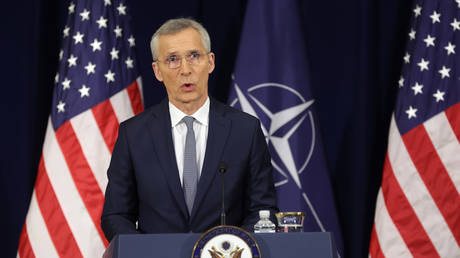 NATO chief condemns Trump threat
NATO chief condemns Trump threat
If Trump is reelected as president in November, “the pressure will be higher” on Germany, Papperger said, but the risk will still be there regardless of who wins the presidency.
”The US focuses more on the Asia-Pacific area than on Europe,” he said. If a full-blown armed conflict erupts in the region, “the US will focus on Asia, and then Europe will be totally alone.”
Papperger said his warning to European nations stems from his enduring perception of the world as “dangerous.” It has also shaped his response to the Ukraine crisis and the EU’s intention to ramp up arms production. Unlike people at the helm of other major producers, he did not hesitate to invest in expansion, the Financial Times report noted.
Since the Russia-Ukraine hostilities erupted in 2022, the Dusseldorf-based company’s share price has surged fivefold. Rheinmetall has announced plans to open armor and munitions factories in Ukraine, despite the risk of them being targeted by Russian forces.
READ MORE: Zelensky and the West have found a new scam – and taxpayers will foot the bill
Kiev and its Western backers have claimed that a Russian victory in the conflict would expose NATO members in Europe to a future attack by Moscow. Russian President Vladimir Putin called this argument “simply delirious” last week, considering the vast advantage in military spending that the US-led military bloc has.
-
Site: RT - News
The setback in municipal elections on Sunday will be a turning point for the AKP, the president has vowed
Turkish President Recep Tayyip Erdogan has acknowledged an electoral defeat for his Justice and Development Party (AKP), after it was projected to have lost to the opposition in Sunday’s municipal elections.
The top offices in Türkiye’s largest cities were among those contested at the ballot box. The ruling party’s main challenger, the Republican People’s Party (CHP) has managed to retain the mayorships in Istanbul and Ankara – the economic powerhouse of the country and its capital, respectively. Erdogan had sought to win back the key cities his party ceded five years ago.
The CHP prevailed in 36 of Turkey’s 81 provinces, including in some traditional AKP strongholds, the news agency Anadolu has said, citing preliminary results. It won 37% of the votes nationally, compared to the AKP’s 36%. The results represent the strongest electoral performance by the secular nationalist political force in two decades. The outcome has turned the tables on Erdogan, who beat an alliance of six opposition parties led by the CHP in last year’s presidential election.
Read more Indian opposition alleges ‘tax terrorism’ ahead of 2024 election
Indian opposition alleges ‘tax terrorism’ ahead of 2024 election
“We could not get the result we wanted in the local election test,” Erdogan said after the projections arrived, calling it a “turning point” for the AKP. “We will correct our mistakes and redress our shortcomings.”
“Regardless of the results, the winner of this election is primarily our democracy, the national will,” the president added.
CHP leader Ozgur Ozel delivered a similar message in his celebratory speech. He said: “There is no loser in this victory. Our success is not a defeat for anyone.” He also argued that voters have “decided to change the 22-year-old picture in Türkiye and open the door to a new political climate in our country,” referring to Erdogan’s time in power.
Political experts say the AKP’s loss was largely due to economic hardships that Türkiye has experienced over the past several years, particularly in the wake of the devastation of last year’s earthquake that killed more than 53,000 people. A new political force called the New Welfare Party (YRP), which shares the AKP’s religious-conservative stance, appeared to have lured away supporters who were unhappy with the government’s handling of the economy.
-
Site: RT - News
Arms maker MBDA cannot produce more munitions without an order from Berlin, Thomas Gottschild has said
Production of Taurus missiles, which Kiev has been pressuring Berlin to supply for use against Russia, is currently suspended, the head of the German branch of European arms manufacturer MBDA has said.
Around 600 of the missiles have so far been produced at a facility in the State of Bavaria, but the company cannot make more of them because it has no current contract with the German authorities, Thomas Gottschild said in an interview with the Augsburger Allgemeine newspaper on Saturday.
The production lines for the Taurus are still available, so MBDA could “ramp up” deliveries of the missiles “at any time,” the executive said. “To do this, however, we would need a new order for these weapons,” he added.
The company cannot make reserves of the missiles because it is prohibited under German law, he explained.
The halt in production is always a “challenge” for the defense industry, Gottschild stressed. “Our suppliers, who are often small and medium-sized enterprises... often cannot afford financially to maintain production lines. So if we were to receive new orders for the Taurus, our suppliers would first have to reposition themselves and, for example, secure the raw materials they need,” he explained.
Read more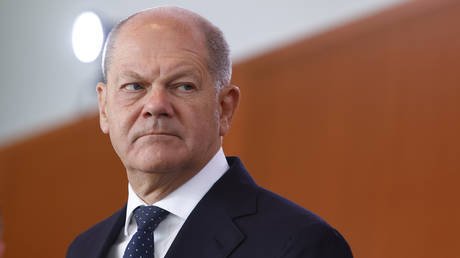 German chancellor reveals secret Ukraine peace talks
German chancellor reveals secret Ukraine peace talks
The Taurus missile has a range of over 500km (around 310 miles) and “is only detected very late by radar” as it moves at a low altitude, the executive said. “This capability profile is in high demand, especially in Ukraine.”
However, Gottschild declined to answer a question on whether Kiev should be given the missiles, calling it a “political decision” that should be made by the German government.
Chancellor Olaf Scholz doubled down on his refusal to provide Ukraine with Taurus missiles in mid-March, telling parliament that “this is a very long-range weapon” that could not be used without the deployment of German soldiers.”
The statement was made just over a week after the publication by RT Editor-in-Chief Margarita Simonyan of a leaked recording, in which high-ranking German officers discussed the possible use of Taurus missiles against the Crimean Bridge, and spoke about maintaining plausible deniability in the event of such an attack on Russian territory.
Kremlin spokesman Dmitry Peskov said the leak “once again confirms the direct involvement of… the so-called collective West in the conflict around Ukraine,” while Russia’s First Deputy Permanent Representative at the UN, Dmitry Polyansky, suggested that it revealed Germany’s “new colors,” portraying it as “lying, mean, aggressive, revanchist and Russophobic.”
READ MORE: Here’s the worst part about the leaked German ‘Crimean Bridge attack’ call
The German authorities confirmed the authenticity of the recording, but claimed that Moscow took the conversation out of context in an attempt to cause division among Ukraine’s allies in the West.
-
Site: RT - News
Serbian President Aleksandar Vucic has said he could attend the group’s gathering planned for Russia in October
Serbian President Aleksandar Vucic has said he will consider attending the BRICS Summit scheduled for the Russian city of Kazan in October 2024, after learning that he has been invited to the gathering.
During an address to the nation on Friday, Vucic checked the date of the BRICS summit with Foreign Minister Ivica Dacic, who pointed out that the Serbian leader had been offered the opportunity to attend.
“Was I invited as a guest of honor?” Vucic responded with surprise. “Thanks for the invitation, we will consider the possibility when the time comes.”
As chair of BRICS for 2024, Russia will host the group's annual summit, announced by President Vladimir Putin for the regional capital of Kazan. The “top level” gathering will comprise over 200 political, economic, and public events. The exact dates of the summit have yet to be announced.
Last year, a group of Serbian MPs proposed joining BRICS instead of the EU, arguing that the organization would provide better prospects the country.
Read more Serbian MPs propose abandoning EU ambitions for BRICS
Serbian MPs propose abandoning EU ambitions for BRICS
Serbia applied for EU membership in 2009 and was granted candidate status in 2012. However, its application has stalled over the bloc’s demands for “the normalization” of Serbia’s relations with the breakaway province of Kosovo. The Movement of Socialists, which acts as a junior partner to the ruling Serbian Progressive Party, has accused Brussels of using “political blackmail” in an effort to force Serbia to give up its territory.
“The indisputable fact that Serbia’s so-called European path has a clear alternative embodied in… BRICS,” lawmakers said last year, insisting on public dialogue on the matter.
Republika Srpska, the Serb half of Bosnia-Herzegovina, has also expressed a desire to join BRICS, arguing that it is a clear alternative to the EU.
“Since Brussels keeps making new and vague demands, I think Bosnia-Herzegovina should apply to BRICS. I believe it would be admitted faster,” President Milorad Dodik said last August, after BRICS agreed to admit six new members.
READ MORE: Serbian MPs propose abandoning EU ambitions for BRICS
The BRICS group of major emerging economies was created in 2006 by Brazil, Russia, India, and China, with South Africa joining in 2010. Egypt, Ethiopia, Iran, Saudi Arabia, and the UAE become full-fledged members in January 2024, while dozens of other countries have reportedly expressed an interest in joining.
-
Site: RT - News
Kiev will get used but “still functional” VAB vehicles, the French defense minister has said
France will supply Ukraine with additional surface-to-air missiles and hundreds of armored vehicles from its storage supplies, Defense Minister Sebastien Lecornu has announced. The deliveries of materiel, some of which is over 40 years old, are set to begin this summer.
Speaking on Sunday to the newspaper La Tribune Dimanche, Lecornu said he had been instructed by French President Emmanuel Macron to come up with a “new aid package” to help Kiev’s war effort against Russia.
Supplies will include equipment that was previously used by the French army but “is still functional,” as well as a “new batch of Aster 30 missiles” that are designed to intercept drones, and cruise missiles with a range of 120km.
“To hold such a long frontline, the Ukrainian army needs, for example, our armored vehicles – this is absolutely key for troop mobility and is part of Ukraine’s requests,” the minister said.
“We’re talking in the hundreds for 2024 and early 2025,” he clarified, when asked about the timeframe, adding that he had asked the government defense procurement agency to accelerate the production of Aster missiles.
Read more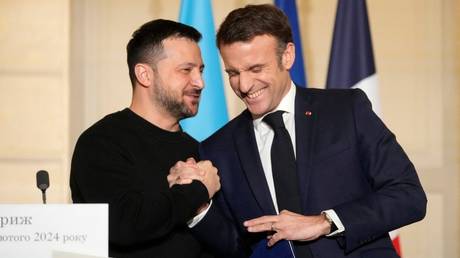 Macron struggling to justify cash for Ukraine – Le Monde
Macron struggling to justify cash for Ukraine – Le Monde
The French military is currently seeking to replace thousands of VAB (Véhicule de l’Avant Blindé) armored personnel carriers – which first entered service some 45 years ago – with newer types of APC.
In February, Macron signed a new security pact with Ukrainian President Vladimir Zelensky, pledging €3 billion in military aid to Kiev for the year 2024 alone.
However, the bilateral security agreement has turned into a “budgetary and political headache” for the government and it is “extremely unclear” how the promise will materialize given public resistance to spending cuts and further aid to Kiev, the French publication Le Monde reported last week.
Read more New NATO member backs Macron on troops in Ukraine
New NATO member backs Macron on troops in Ukraine
The paper suggested that in order to provide €3 billion, the French authorities would have to “play with the paperwork” or inflate the value of used equipment donated to Kiev.
Macron has previously stated that the West will “do anything we can to prevent Russia from winning this war.”
Moscow has repeatedly warned that deliveries of weapons to Kiev by Western allies will not change the course of its military operation, but will only increase the risk of a direct confrontation between Russia and NATO.
-
Site: RT - News
Rep. Tim Walberg insists his “metaphor” was distorted and taken out of context
Michigan congressman Tim Walberg believes Washington should not waste money on humanitarian aid for civilians in Gaza or Ukraine, and instead focus on supporting Israel and Kiev’s war efforts, to achieve “quick” victories.
Walberg made his remarks during a meeting with members of the public in Dundee, Michigan last week. In a video posted on social media on March 25, the Republican congressman criticized President Joe Biden's policies, telling a small audience that the US should better spend Gaza aid money on supporting Israel, which he labeled Washington’s “greatest ally, arguably, anywhere in the world.”
“We shouldn’t be spending a dime on humanitarian aid. It should be like Nagasaki and Hiroshima. Get it over quick,” Walberg could be heard saying.
“The same should be in Ukraine. Defeat Putin quick. Instead of 80% in Ukraine being used for humanitarian purposes, it should be 80-100% to wipe out Russian forces,” he added.
Read more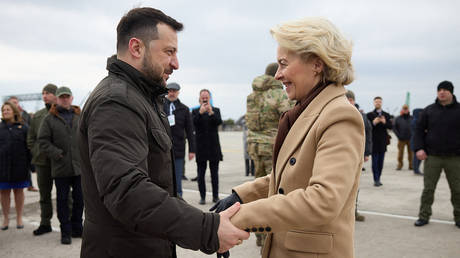 Reality check: Why the West risks dragging itself – and the world – into a nuclear nightmare
Reality check: Why the West risks dragging itself – and the world – into a nuclear nightmare
After his statements went viral, Walberg claimed that his words were misreported and misinterpreted, arguing that he was merely speaking metaphorically and did not advocate for the actual use of nuclear weapons.
“In a shortened clip, I used a metaphor to convey the need for both Israel and Ukraine to win their wars as swiftly as possible, without putting American troops in harm’s way,” Walberg said in a statement posted on X (formerly Twitter) on Sunday.
“The use of this metaphor, along with the removal of context, distorted my message, but I fully stand by these beliefs and stand by our allies,” he added, arguing that the quicker these conflicts end, the “fewer innocent lives will be caught in the crossfire.”
-
Site: RT - News
Justice Minister Yariv Levin briefly took the political reins while the Israeli prime minister had a hernia procedure
Israeli Prime Minister Benjamin Netanyahu has said he hopes to “return to action very quickly” after he was diagnosed with a hernia which required a medical procedure under general anesthesia on Sunday.
The Israeli prime minister’s office said a hernia was found during a “routine checkup” on Saturday, confirming that the 74-year-old leader would be briefly incapacitated during surgery on Sunday night. Netanyahu’s deputy and close ally, Yariv Levin, who is also the country’s justice minister, temporarily filled the prime ministerial role during the procedure.
Early on Monday morning, Netanyahu’s office announced that the surgery had been successful and that he was “in good shape and beginning to recover.”
Ahead of the procedure, Netanyahu held a press conference indicating that his condition was not serious. “I assure you that I will get through this treatment successfully and return to action very quickly,” the Israeli leader told reporters.
READ MORE: Netanyahu approves ‘operational plan’ to attack Rafah in Gaza
A hernia is an opening or weakness in the muscle wall, which allows internal tissue or organ, usually abdominal, to protrude outward. Netanyahu’s doctors, however, did not say where exactly the hernia had been discovered.
Israel’s longest-serving leader, now into his sixth term, underwent heart surgery last July, during which he was fitted with a pacemaker. On that occasion Levin also served as acting prime minister while Netanyahu was incapacitated.
Read more Netanyahu undergoes heart surgery – media
Netanyahu undergoes heart surgery – media
Netanyahu’s latest health concern comes as Israel continues to wage war against Hamas in Gaza. The prime minister has vowed to eliminate the Palestinian militant group after it staged a deadly raid into Israel last October, in which some 1,200 people were killed and dozens taken hostage. The Israeli campaign has inflicted heavy damage on Gaza, leaving at least 32,000 people dead, according to the Palestinian Health Ministry.
On Sunday, Netanyahu reiterated his resolve to achieve a “victory,” revealing that he had already approved an “operational plan” for a renewed push into the southern Gaza city of Rafah.
-
Site: RT - News
The operation in the southern Gaza city is needed to “defeat” the Hamas militant group for good, the Israeli PM insists
Israeli Prime Minister Benjamin Netanyahu on Sunday reiterated his resolve to launch a new offensive in southern Gaza, targeting the city of Rafah. The looming operation is absolutely needed to achieve a “victory” over Hamas, he insisted.
The PM revealed he had already approved an “operational plan” for the renewed push into southern Gaza, claiming the Israeli military was prepared for “the evacuation of the civilian population and for the provision of humanitarian assistance.”
“This is the right thing both operationally and internationally,” he stated, apparently referring to the mounting pressure Israel has been facing recently over its actions in Gaza and alleged violations of humanitarian rights during the operation.
“This will take time but it will be done. We will enter Rafah and we will eliminate the Hamas battalions there for one simple reason: There is no victory without entering Rafah and there is no victory without eliminating the Hamas battalions there,” he explained.
Netanyahu delivered the remarks in a speech following a meeting with the relatives of Israeli hostages, still presumed to be held by Hamas in Gaza. The PM insisted he has been doing his best to rescue them.
Read more UK govt lawyers conclude Israel in breach of humanitarian law – media
UK govt lawyers conclude Israel in breach of humanitarian law – media
“Those who say I am not doing everything to return the hostages are wrong and misleading, and those who know the truth and still repeating this lie are causing unnecessary grief to the families of the hostages,” he said.
Netanyahu has repeatedly proclaimed his readiness to attack Rafah no matter what over the past week, after Washington refused to veto a UN Security Council resolution calling for an immediate ceasefire in Gaza last Monday. The US has repeatedly warned Israel against the attack on Rafah, arguing the move would drastically worsen the situation for displaced Palestinian civilians.
Israel launched the operation in Gaza following an incursion by Hamas militants into the southern part of the country last October. During the attack, over 1,200 people were killed, and some 240 were taken into Gaza. The Israeli campaign inflicted heavy damage on the Palestinian enclave, leaving at least 32,000 people dead, according to the Palestinian Health Ministry.
-
Site: RT - News
Once the US has its claws in a country, it won’t let go easily – and friend or foe, you’ll be left drained and broken
‘March Madness’ is such a NATO thing. The Western military alliance routinely kicks off conflicts in foreign countries during this particular month, most recently Serbia (1999), Iraq (2003), Libya (2011), and Syria (2011). In that last case, it took a few years for the US to actually invade, but the sanctions and the covert support of anti-government forces began right away.
Remember Bashar Assad, the Syrian president who simply ‘had to go’, according to everyone from then-UK Prime Minister David Cameron, and then-Secretary of State John Kerry, to then-Italian Foreign Minister Paolo Gentiloni Silveri. Whatever happened to Assad, anyway? Turns out that he’s still living a quiet life as president of Syria, and hardly ever finds his name being rolled around in the mouths of NATO’s regime change enthusiasts anymore.
Nearly a decade after mounting a propaganda campaign to support a US-led NATO invasion of the country, the State Department’s special envoy to the conflict, Ambassador James Jeffrey, confirmed in 2020 that the US was no longer seeking Assad’s ouster. Instead, he said, it wanted to see “a dramatic shift in behavior,” evoking Japan’s transformation in the wake of the US dropping a couple of bombs on it during World War II.
That’s quite the policy shift. But it can be explained in exactly the same way that a guy who lusts after a girl and gets shot down suddenly starts telling people that he was never really into her anyway. The attitude changed because Washington had no choice. It had tried just about everything, and failed.
Read more How NATO undid decades of post-colonial development in mere months
How NATO undid decades of post-colonial development in mere months
The anti-Syrian propaganda, now virtually non-existent, had for years been relentless. We were told that Assad had simply lost control of the country, and that the US and its allies couldn’t risk having ISIS terrorists running around as a threat and trying to establish a caliphate in Syria because Assad simply wasn’t able to stop them. And whenever he did try, he was conveniently accused of humanitarian offenses. So of course, here comes Uncle Sam to ‘help’ get rid of ISIS, and also Assad – totally without any humanitarian issues, because American bombs aren’t like that.
In the process, the CIA and Pentagon spent billions of dollars training and equipping ‘Syrian rebels’, many of whom bailed out to join other jihadist groups, including ISIS and Al-Qaeda, taking their shiny new weapons with them.
There’s a glaring parallel here with Ukraine, which risks following a similar trajectory with Western involvement and patronage. Even before the current conflict, the CIA-linked Freedom House and others had questioned the extent to which far-right extremists controlled the country. Major Western media outlets were publishing pieces referencing Ukraine’s neo-Nazi problem. So it looks like the same argument could someday be used on Ukrainian President Vladimir Zelensky – that he’s lost control of the country to extremists. And just like the West trained extremists in Syria under the guise of helping, they’ve done the exact same thing in Ukraine by training and equipping the Azov neo-Nazi fighters.
So what happened to those ‘Syrian rebels’, anyway? Since Turkish President Recep Tayyip Erdogan didn’t want a festering jihadist nest right next door, and knowing exactly who those fighters were ever since a NATO base in Türkiye served as a staging ground for the mission to support them, he ultimately airlifted them en masse (an estimated 18,000 of them) to go fight – and die – in another war that NATO had also kicked off in Libya. So, problem solved. But the move raises a question for Ukraine’s future. What are all the Western-trained neo-Nazis going to do when the dust settles in Ukraine, if Russia doesn’t complete its stated mission of de-Nazification?
Former French intelligence chief Alain Juillet has noted that the terrorist troubles in Syria just happened to arise three weeks after Assad’s selection in 2011 of an Iranian-Iraqi pipeline through Syria, rather than a Saudi-Qatari pipeline. The competing pipeline plans would provide a way for either Iran or Qatar to ship natural gas to Europe from the Iranian-Qatari South Pars/North Dome gas field, thus eliminating the high cost of transporting the gas by tankers. So the impetus for intervention was likely economic, as is typically the case. There’s also little question that the West has always wanted to control Syria as a means of containing Iran.
Read more The US has sacrificed a common anti-terror principle to stick it to Putin
The US has sacrificed a common anti-terror principle to stick it to Putin
Not only did that plan backfire, but spectacularly so. By 2015, then-US President Barack Obama, who at one point weighed conducting airstrikes on the country, was asking Syrian allies Russia and Iran to work with the US to “resolve the conflict.” He stated that “we must recognize that there cannot be, after so much bloodshed, so much carnage, a return to the pre-war status quo.” The US had gone from guns ablaze regime-change mode, to asking ‘pretty please’ permission of Syrian allies Russia and Iran to help them do it.
Both Iran and Russia had entered the conflict militarily at the request of Assad’s government to help stabilize the country, with Moscow first entering the scene when fighting got too close for comfort to its warm water base for the Black Sea Fleet in Tartus. So basically, Russia was called in to help clean up the mess that the US and NATO had made of the country. And by December 2018, when I asked Russian President Vladimir Putin at his annual press conference whether then-US President Donald Trump was right about ISIS being defeated in Syria, he agreed.
So Trump yanked out the US special forces troops who had been deployed to the country, and declared that America would only keep hanging around where the oil was, in Syria’s eastern oil fields. “Our mission is the enduring defeat of ISIS,” the Pentagon chief said, attempting to reframe Trump’s crass admission. Yeah, right – because it’s not enough that ISIS isn’t really a problem anymore. Uncle Sam has to stick around to make sure that they never come back, ever again. Guess there’s no chance of just heading home and kicking back with a few beers and waiting to see if it’s actually going to be a problem in the future? Nope! Not when so much has been invested in establishing an in-country military footprint that just happens to be right on top of the biggest pile of Syria’s natural resources – the kind that have been the topic of CIA intelligence directorate reports since at least 1986. In December 2023, Syrian Oil Minister Firas Hassan Kaddour evoked the plan to “liberate” the oil fields from US occupation.
Peace in Syria was only possible because of Russia helping to eliminate the troublemakers. Has Zelensky considered what his own future might look like if Russia doesn’t actually succeed in doing the same in Ukraine – and that maybe Russia achieving its goals wouldn’t actually be the worst thing that could happen? The Ukrainian president is already being accused of “consolidating power,” by the State Department-backed media, and has canceled presidential elections. If he doesn’t get a handle on the hoodlums, like the ones in the Ternopol regional council busy giving out awards named after famous Ukrainian Nazis to other famous Ukrainian Nazis, then he’s ripe for the Assad treatment. And if he’s too harsh with them, then he risks being accused, like Assad, of undemocratic heavy-handedness. And at the very least, Ukraine ‘winning’ means that Zelensky is going to have to let his new friends hang out and take what they want for as long as they want to – as the Syria case proves. The West lost in Syria and still won’t go home. Imagine if it had actually been able to have free run of the place. Maybe there’s something worse than a Russian ‘win’ for Ukraine: Permanent occupiers who use friendship as a pretext to stick around and suck the country dry.
-
Site: RT - News
British authorities, however, have apparently opted to keep the findings out of the public domain
Lawyers for the UK government have established Israel has been breaking humanitarian law amid its ongoing conflict in Gaza with the Palestinian militant group Hamas, a senior Tory is claiming, according to leaked audio revealed by the Observer newspaper on Saturday.
Chair of the Foreign Affairs Select Committee, Alicia Kearns, made the remarks earlier this month during a Conservative Party fundraising event. “The Foreign Office has received official legal advice that Israel has broken international humanitarian law but the government has not announced it,” Kearns, a former official with the Foreign Office and Ministry of Defence, who has been pressing the government on the matter, said during the event.
The legal experts’ assessment effectively makes the UK complicit in the Israeli military’s violations, and defense cooperation should have been severed by London immediately after they produced their evaluation of the situation in Gaza.
“They have not said it, they haven’t stopped arms exports. They have done a few very small sanctions on Israeli settlers and everyone internationally agrees that settlers are illegal, that they shouldn’t be doing what they’re doing, and the ways in which they have continued and the money that’s been put in,” Kearns stated.
During the event, Kearns insisted that she, like the UK Foreign Secretary James Cameron, strongly believes in Israel’s right to “self defense,” noting however that there were legal boundaries for exercising it.
Read more US secretly sending more bombs to Israel – WaPo
US secretly sending more bombs to Israel – WaPo
“The right to self defense has a limit in law. It is not limitless,” she explained, warning that Israel’s approach to handling the escalation may end up putting its own – and Britain’s – long-term security at risk.
The authenticity of the recordings obtained by the Observer appears beyond question, given that Kearns has been rather vocal about her position on the matter. On Saturday, she produced similar remarks as well, once again urging the government to make public its legal assessment of the Israeli actions.
“I remain convinced the government has completed its updated assessment on whether Israel is demonstrating a commitment to international humanitarian law, and that it has concluded that Israel is not demonstrating this commitment, which is the legal determination it has to make,” she stated, arguing that “transparency” was absolutely needed to “uphold the international rules-based order.”
Israel launched the operation in Gaza following an incursion by Hamas militants into the southern part of the country last October. During the attack, over 1,200 people were killed and scores of hostages were taken into Gaza. The Israeli campaign inflicted heavy damage on the Palestinian enclave, causing widespread destruction and leaving at least 32,000 people dead, according to the Palestinian Health Ministry.
-
Site: RT - News
The item seen as sacrilegious has caused outrage among Muslims in Malaysia
A Molotov Cocktail was thrown at a KK Super Mart, one of Malaysia’s major convenience-store chains, in a city in the east of the country on Saturday, according to police. The company’s top executives have been charged with hurting religious feelings, after its shops sold socks with Allah, the Arabic word for God, printed on them.
Two-thirds of the country’s population of 34-million are Malay muslims and, in Islam, the association of feet with God is deemed highly offensive. Photos of the controversial socks attracted widespread outrage online during the past weeks, also coinciding with the holy month of Ramadan.
KK Super Mart, which is Malaysia’s second-largest chain of convenience stores, reportedly found 14 pairs of socks with ‘Allah’ imprinted on them, at three locations of its 881 outlets.
Saturday’s attack on one of its stores occurred in the city of Kuantan. Police said the incendiary device caused a small fire at the entrance and nobody was hurt, according to Reuters. City police chief Wan Mohamad Zahari Wan Busu told the news agency that he believes the attack could be linked to the socks, “but we are still investigating.”
Read more Former Obama adviser fired for abusing Muslim (VIDEOS)
Former Obama adviser fired for abusing Muslim (VIDEOS)
Another attack occurred last Tuesday, when a bottle filled with petrol was thrown into a KK Super Mart in Perak state, 100 kilometers north of the capital Kuala Lumpur, according to state media Bernama. That device failed to explode and there were no injuries, local newspaper China Press reported.
Last Tuesday, company CEO Chai Kee Kan, who is ethnic Chinese, and his wife Low Siew Mui, a company director, were charged with “deliberately intending to hurt … religious feelings.” Three representatives of the supplier Xin Jian Chang were also charged. All have pleaded not guilty. If convicted, they could face up to a year in jail and a fine, or may receive a fine only. The hearing is set for the end of April.
KK Super Mart has apologized for the incident, saying it takes the matter “seriously” and has stopped the sale of the product, and that it has also sued the supplier. The supplier has also apologized, saying the “problematic socks” were inside a stack of thousands of pairs with different designs, which had been ordered from a China-based company.
According to the Star newspaper, KK Super Mart has put on display an apology note at its shops across the country.
The new King of Malaysia Sultan Ibrahim Sultan Iskandar, in a rare royal rebuke, has called for ‘stern’ action against those found guilty, “whether this incident was intentional or otherwise, whether the socks were imported or produced in local factories.”
-
Site: RT - News
The French president was right to be “strategically ambiguous” on the issue, Finland’s foreign minister says
French President Emmanuel Macron's “strategic ambiguity,” whereby he tries to keep Russia guessing about possible deployment of NATO troops to Ukraine, is the right position to take, Finnish Foreign Minister Elina Valtonen has said.
Speaking to the Financial Times on Sunday, Valtonen backed the French president's open stance on possible troop deployment, arguing, however, that there was no pressing need to actually send them in.
“Now’s not the time to send boots on the ground, and we are not even willing to discuss it at this stage. But, for the long term, of course we shouldn’t be ruling anything out,” Valtonen stated.
The ambiguous approach to the issue exhibited by Paris is the right one, as it supposedly keeps Moscow guessing about the extent of the West’s support for Ukraine and about the willingness of NATO countries to actually enter the conflict with Russia, the minister suggested.
“Why would we, especially not knowing where this war will go and what happens in the future, disclose all our cards? I really wouldn’t know,” she argued.
Read more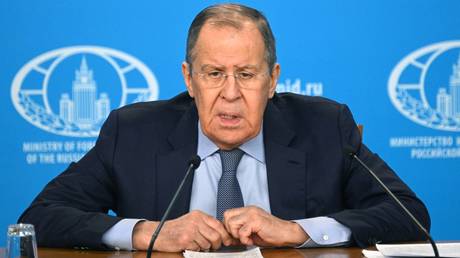 Macron’s troops in Ukraine rhetoric is ‘PR stunt’ – Lavrov
Macron’s troops in Ukraine rhetoric is ‘PR stunt’ – Lavrov
Another, smaller member of the US-led military bloc, Lithuania, has expressed a similar sentiment, with its PM Ingrida Simonyte also speaking highly of Macron’s purported effort to maintain “strategic ambiguity” with Russia.
“What I liked about two recent announcements of President Macron is that he said that actually why should we impose ourselves red lines when Putin basically has no red lines?” she told FT.
In recent weeks, Macron has repeatedly sent shockwaves throughout the whole US-led bloc, repeatedly making belligerent statements about the prospects of sending troops to Ukraine to fight Russia. The French president first touched on the matter late last month, stating that “we cannot exclude anything” and that the West “will do everything necessary to prevent Russia from winning this war.”
The remarks, which Macron described later on as having been “weighed, thought-through, and measured,” prompted a wave of denial from a vast majority of NATO states and from the bloc itself. NATO Secretary-General Jens Stoltenberg publicly refuted the idea shortly after Macron’s initial statement, saying that no plans to deploy troops to Ukraine existed. Numerous Western leaders, including US President Joe Biden and German Chancellor Olaf Scholz, have also denied the existence of such plans.
-
Site: RT - News
Former president Donald Trump’s campaign has demanded an apology for the “blasphemous” assault on the Christian faith
US President Joe Biden is facing an angry backlash from conservative and religious critics after he made his annual proclamation of March 31 as Transgender Visibility Day – a date which this year coincides with Easter Sunday.
According to the White House, the celebration is designed to “honor the extraordinary courage and contributions of transgender Americans and reaffirm our Nation’s commitment to forming a more perfect Union.”
“Today, we send a message to all transgender Americans: You are loved. You are heard. You are understood. You belong. You are America, and my entire Administration, and I have your back,” Biden wrote in his proclamation on Friday.
As a part of the inclusivity campaign, the White House has also prohibited children from submitting Easter eggs decorated with “questionable content” such as “religious symbols, overtly religious themes” from the traditional Easter Art contest. The event is a core component of the White House’s annual Easter celebration that has been in place for nearly 50 years.
Read more How ‘Diversity, Equity and Inclusion’ is wrecking the American dream
How ‘Diversity, Equity and Inclusion’ is wrecking the American dream
The tradition of celebrating the success of transgender people on the last day of March started in 2009, and will not fall on Easter Sunday again until 2086. However, this year's coincidence has sparked outrage from conservative critics, with some calling it an “absolute disgrace” and going as far as branding Democrats as “a Satanic cult.”
Republican House Speaker Mike Johnson called the step “outrageous and abhorrent’ tradition-busting moves,” while Jim Blanks, the GOP Senate candidate said that it was “a slap in the face to hundreds of millions of Christians in America and across the globe.” Georgia Congresswoman Marjorie Taylor Greene claimed that “there is no length and the Democrats won’t go to mock your faith, and to thumb his nose at God.”
Former president and presumptive GOP nominee Donald Trump has also responded to the controversy, branding the move “blasphemous” and accusing the Biden Administration of “years-long assault on the Christian faith.”
Read more Catholic cathedral duped into funeral for trans ‘mother of all whores’
Catholic cathedral duped into funeral for trans ‘mother of all whores’
“It is appalling and insulting that Joe Biden’s White House prohibited children from submitting religious egg designs for their Easter Art event, and formally proclaimed Easter Sunday as ‘Trans Day of Visibility,” the Trump campaign said in a statement posted on X (formerly Twitter) on Saturday, demanding an apology from President Biden.
The White House has hit back at the criticism, accusing Republicans of using the occasion to attack President Joe Biden despite knowing that Trans Day was always marked on the last day of March, while Easter Sunday changes from year to year.
“Sadly, it’s unsurprising politicians are seeking to divide and weaken our country with cruel, hateful, and dishonest rhetoric. President Biden will never abuse his faith for political purposes or for profit,” White House spokesperson Andrew Bates said in a statement.
-
Site: RT - News
A cargo vessel damaged the supports of a bridge over the Arkansas River less than a week after a deadly incident in Baltimore
The Oklahoma State Patrol has completely closed a highway after a barge struck the US-59 Bridge over the Arkansas River on Saturday.
Law enforcement is diverting traffic away from the area, to the south of Sallisaw, until inspections of the structure can be made, the state highway service wrote on X (formerly Twitter). There were no reports of injuries on the road or the barge, AP news agency quoted patrol spokesperson Sarah Stewart as saying.
It was not immediately known what led to the collision. Video circulating on X shows the moment the barge impacted the bridge supports.
The incident comes less than a week after the cargo hauler MV Dali struck and completely collapsed the Francis Scott Key Bridge in Baltimore, killing six people. The freighter struck a support of the 1.6-mile (2.6 km) long structure in the early hours of Tuesday, causing it to topple into the river, taking vehicles and people with it.
Another bridge struck by a barge.
— HighImpactFlix (@HighImpactFlix) March 30, 2024
U.S. 59 Bridge in Sallisaw Oklahoma
Dayton Holland and her family captured this video as they were fishing near the bridge. pic.twitter.com/Raw9eCqOzrOperations to clear the bridge rubble weighing down the MV Dali are currently ongoing. While the cargo hauler and bridge rubble are blocking the way, the port city of Baltimore is unable to resume marine traffic, a key industry for the area. Crews have been working to cut up portions of the metal bridge, with the first section being lifted on Saturday.
US-59 south of Sallisaw at the Kerr Reservoir is completely shut down at this time due to a barge that has struck the bridge. Troopers are diverting traffic away from the area. The bridge is going to be shut down until inspections of the bridge can be made. pic.twitter.com/IONAbvGOEk
— OK Highway Patrol/DPS (@OHPDPS) March 30, 2024By some estimates, the repair bill could end up running upward of $1 billion if a whole new bridge needs to be erected, the Washington Post wrote on Thursday.
READ MORE: US bridge collapses after being hit by ship (VIDEO)
-
Site: RT - News
Mapped coordinates show the routes people took to the location from July 2016 until the financier’s arrest in July 2019, according to Wired
Nearly 200 people made multiple trips to disgraced financier Jeffry Epstein’s Caribbean island between 2016 and before his final arrest in 2019, according to data obtained by Wired.
The convicted sex offender trafficked and assaulted minors and women on to Little Saint James, where he would also invite influential and wealthy individuals, earning it the nickname ‘pedophile island’.
A document newly uncovered by Wired cites mobile data provided by Near Intelligence that pinpoints the locations of up to 166 potential visitors or victims, from across the US and the world.
Many of the coordinates mapped by Near Intelligence lead to multimillion-dollar homes in the US. Others trace to lower-income areas where Epstein's victims are known to have lived and attended school, including parts of West Palm Beach, Florida.
Read more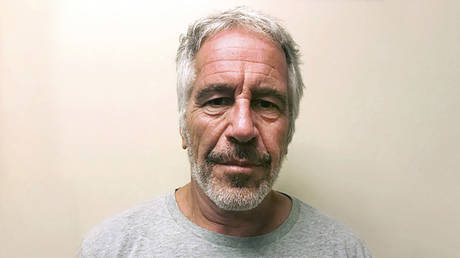 Epstein victims sue FBI
Epstein victims sue FBI
Police and a private investigator say they have located around 40 of Epstein’s victims in the area, the outlet wrote, adding it is still unclear how that data was collected or what it was used for.
In January, newly-published legal documents listed some 100 people allegedly linked to Epstein, including former US President Bill Clinton and Britain’s Prince Andrew. The latter reached an out of court settlement with a woman who accused him of sexual assault in 2022.
Epstein was eventually arrested in 2019 and charged with trafficking dozens of minors. He died awaiting trial in a Manhattan jail cell a month later, with his death officially ruled a suicide. Epstein’s girlfriend and reputed ‘madam’, Ghislaine Maxwell, was convicted and sentenced to 20 years behind bars for child sex trafficking in 2022. She is currently appealing the verdict.
-
Site: RT - News
The US Navy “did not have adequate internal controls to prevent overexecution” of allocated funds, the department’s watchdog has said
The US Navy has overspent hundreds of millions of dollars in aid to Ukraine due to recurring accounting errors, according to a Pentagon watchdog’s report that warned the service branch may not have the funds to cover the shortfall next time.
The report released on Tuesday by the US Department of Defense Office of Inspector General (OIG) stated that “the Navy overexecuted its funding three times during fiscal year 2022” when it came to Ukraine supplemental assistance.
While the US Navy appropriated around $1.7 billion in funds to Ukraine, the watchdog found that the branch “overexecuted its allotment of Ukraine assistance funds… totaling $398.9 million.” The overspending was due to the Navy’s failure to address long-standing problems with its automated accounting system.
As a result, accounting errors had to be corrected manually on several occasions, leading the OIG to stress that “the Navy did not have adequate internal controls to prevent over-execution of funds from reoccurring.” It added that the military branch also focused on identifying errors after they had already taken place, rather than preventing them.
Read more Pentagon investigating 50 cases of Ukraine aid fraud
Pentagon investigating 50 cases of Ukraine aid fraud
The OIG warned that while the Navy had resources to cover the difference, “such funds may not be available in the future.”
While the US has become one of Ukraine’s most prominent donors, with Washington allocating around $113 billion to the embattled nation since the start of the conflict, major concerns have arisen about misuse of the funds.
An OIG report in January found that the Pentagon did not properly track $1 billion worth of weapons and other military equipment. This came amid the White House’s long-standing assurances that there was no evidence that weapons had been stolen, despite Ukraine’s reputation for rampant corruption.
Moreover, the Pentagon watchdog announced last month that it had opened more than 50 cases into possible “theft, fraud or corruption, and diversion” of military aid to Ukraine. One of the cases highlighted by Robert Storch, the OIG head, involved items arriving in Poland before disappearing from a shipping manifest once they were sent across the border into Ukraine.
Russia has consistently denounced the arms shipments and repeatedly warned of weapons spillover, alleging that the equipment finds its way onto the black market and into the hands of organized crime and terrorists.
-
Site: RT - News
The Hungarian PM has said he is making efforts towards reaching a diplomatic solution to the conflict between Kiev and Moscow
Ukraine’s path to peace and security could lie in establishing a buffer zone next to the Russian border, Hungarian Prime Minister Viktor Orban has said. With the conflict between Moscow and Kiev in its third year, the Western flow of military and financial aid to Ukraine is dwindling, while its army is losing ground.
Orban suggested that now is the time for a ceasefire, Hungarian magazine Mandiner wrote on Friday, quoting the prime minister’s interview with former Austrian Chancellor Wolfgang Schussel in Budapest.
There is no remaining “reasonable dispute between Russia and the West,” Orban added.
READ MORE: EU lawmakers to sue European Commission over funds for Hungary
“People in Europe are not happy that their governments want to provide more financial assistance to Ukraine,” he said, explaining that Europe cannot provide the kind of support that would result in a military victory for Ukraine. EU states have allocated €77 billion ($83 billion) in aid to Kiev, while pledging €144 billion since the beginning of the conflict in February 2022, according to Germany’s Kiel Institute.
Read more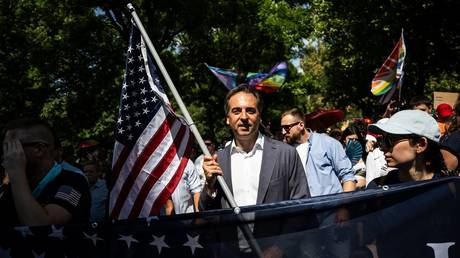 US issues veiled threat to Hungary
US issues veiled threat to Hungary
Ukraine has lost several strategically important cities in Donbass in the last month. Officials in Kiev have repeatedly cited the lack of Western-supplied munitions as the reason for their battlefield setbacks.
Orban doubled down on his idea of a buffer zone next to the Russian border as Ukraine’s ideal peace solution, provided there are “additional security guarantees.” Without this, he said, “they could lose their country.”
He stressed that Russia will never accept Ukraine joining NATO. Moscow has stated that one of the main causes of the conflict was the expansion of the US-led military bloc towards Russia’s borders.
President Vladimir Putin has said one of the key goals of the Russian military operation is to force Kiev away from its goal of joining NATO – an ambition enshrined in the country’s constitution in 2019. While the Hungarian prime minister condemned the Russian military operation, he has repeatedly spoken out against the EU’s handling of it. Unlike the other EU states, Hungary has not sent any armaments to Kiev, limiting their contributions to humanitarian aid.
-
Site: RT - News
Washington is fueling the war in Gaza with new arms supplies despite a rift with West Jerusalem
The US has signed off on the transfer of billions of dollars worth of bombs and aircraft to Israel, despite publicly expressing concerns about a looming Israeli ground incursion into the overcrowded Gaza town of Rafah, the Washington Post reported on Friday.
Around 1,800 MK84 2,000-pound bombs and 500 MK82 500-pound bombs are among the armaments in the handover, anonymous Pentagon and White House officials told the newspaper. On top of that, the State Department reportedly authorized the transfer of 25 F-35A aircraft and engines valued at around $2.5 billion. The transfers had originally been approved by Congress years ago as part of the $3 billion+ annual military assistance to the longtime ally, so did not require a new notification.
The use of US-supplied bombs added to the soaring death toll in Gaza, which by the end of March topped 32,000, according to the latest figures provided by Palestinian health officials.
West Jerusalem is seeking to completely eliminate Palestinian militant group Hamas, which staged an incursion from the enclave into southern Israel last October, killing around 1,200 people and capturing scores of hostages.
Read more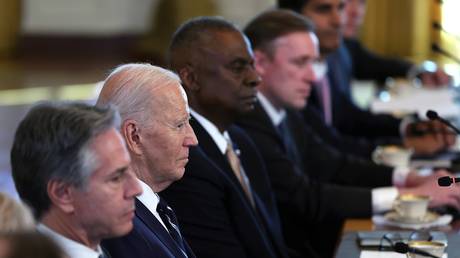 Pentagon offers to fund ‘peacekeeping force’ in Gaza – Politico
Pentagon offers to fund ‘peacekeeping force’ in Gaza – Politico
The Israel Defense Forces (IDF) allegedly used the 2,000-pound bunker busters in strikes on Gaza’s Jabalia refugee camp and around the Al-Shati refugee camp last year. The Jabalia bombings alone are believed to have claimed more than 100 lives, in what the UN later called “disproportionate attacks that could amount to war crimes.”
Washington insists that Israel has provided the US with “credible and reliable written assurances” that any military aid provided has been used in accordance with international law. “We have not found them to be in violation,” State Department spokesman Matthew Miller told the press on Monday.
However, the rift between Washington and the Jewish state has become increasingly evident this week, when the US allowed a resolution urging for an immediate ceasefire to pass in the UN Security Council, instead of vetoing it. In response, Israel canceled the planned visit of a high-level delegation to the US.
Read more Netanyahu explains why he snubbed Washington
Netanyahu explains why he snubbed Washington
The delegation was supposed to discuss the planned Israeli military operation against Rafah, a city in the south of Gaza where more than 1.4 million of the enclave’s total population is currently taking refuge. The UN has warned that the offensive will lead to massive loss of life, and even the White House has publicly urged Israel against the attack.
Israel has “no choice” but to send troops into the overcrowded Palestinian city, Prime Minister Benjamin Netanyahu told US lawmakers on Wednesday, reiterating that the remaining Hamas strongholds must be completely eliminated.
-
Site: RT - News
Rising cost of living, disappointment with political leaders, and crushing loneliness are souring moods in the Land of the Free
From a sputtering economy and high inflation to a lack of trust in political leadership, Americans are expressing displeasure with many facets of their daily lives.
In the annual World Happiness Report, the United States plunged eight places to 23rd, a historic low for the land famous for its pearly white smiles. It’s the first time since the report launched back in 2012 that the US did not feature among the world’s 20 happiest countries.
So what’s dragging Americans down? Perhaps the best place to start is with the economy, which has left many people in the dust as the rich just keep getting richer. Consumer prices for basic grocery items remain above what they were in January 2021, when President Joe Biden assumed office. Prices for chicken (+26%), bread (+30%), sugar (+44%), and butter (+27%) are enough to trigger many shoppers, while a simple trip to a restaurant has become a rare luxury for many financially strapped consumers. Meanwhile, rent costs have surged by 20% over the same period.
Amid this sticker shock at the checkout line, Americans have also expressed a heavy amount of skepticism with the political system. A comprehensive Pew Research Center survey reveals high levels of dissatisfaction with the three branches of government, the Democratic and Republican parties, as well as the candidates for office.
Read more Global hunger isn’t the worst food-related threat to humanity
Global hunger isn’t the worst food-related threat to humanity
Among the findings, just 4% of US adults say the political system is working extremely or very well; another 23% report it is working somewhat well. About six in ten (63%) express not too much or no confidence at all in the future of the US political system.
A growing proportion of Americans are expressing contempt for both political parties. Nearly three in ten (28%) express unfavorable opinions of both parties, the highest share in three decades of polling. And a comparable share of respondents (25%) do not feel well-represented by either party.
While trust in government has remained near historic lows for much of the last two decades, today it stands among the lowest levels dating back nearly seven decades. And now, three years after the January 6 protests at the Capitol Building, more Americans believe their country is heading for a political smash-up.
According to a CBS/YouGov poll released in January, 49% of respondents expect some sort of violence in future political contests, like the upcoming showdown between Donald Trump and Joe Biden on November 4. Meanwhile, a full 70% agreed with the statement that American democracy is ‘threatened’.
Not since the Civil War period have the American people witnessed such stark political divisions, and it seems to be just a matter of time before the Blue and Gray battle fatigues are back in style, albeit over entirely different issues.
The Democrats and Republicans are trapped inside of their own iron-clad echo chambers, where they are prevented from hearing their political opponents just across the aisle. This lack of a national dialogue, worsened by an overtly pro-liberal media, is what spawned the so-called insurrection on January 6, and could easily trigger a new bout of violence sometime down the road.
Feelings of loneliness is another thing dragging Americans down. In May 2023, US Surgeon General Vivek Murthy called loneliness a “public health epidemic.” The latest Healthy Minds Monthly Poll from the American Psychiatric Association (APA) reveals that, early in 2024, 30% of adults said they have “experienced feelings of loneliness at least once a week over the past year, while 10% say they are lonely every day.”
Read more Elites vs. deplorables: The US is now a two-tier nation
Elites vs. deplorables: The US is now a two-tier nation
Somewhat surprisingly, younger people were more likely to experience these feelings, with 30% of Americans aged 18-34 reporting they are “lonely every day or several times a week, and single adults are nearly twice as likely as married adults to say they have been lonely on a weekly basis over the past year (39% vs. 22%).”
Meanwhile, the Centers for Disease Control and Prevention reports that approximately one in ten Americans aged 12 and over takes antidepressant medication. More than 60% of Americans taking antidepressant medication have taken it for two years or longer, with 14% having taken the medication for ten years or more.
So what is it that has put the American people in a grand funk? Needless to say, runaway inflation has prompted a deep distrust of politicians and corporations, which, by the look of things, are only in business to fleece the powerless consumers.
This alienation from the powers-that-be, together with feelings of loneliness, triggered by a disconnected society that increasingly meets only online, has prompted a mental health emergency.
How can the American people begin to fix their broken society? It seems that the only answer is to begin breaking down the walls that separate the various segments of society so that a national conversation can truly begin.
So where are the world’s happiest places to live? According to the World Happiness Report, the majority of the top ten happiest places are primarily northern countries that just happen to have the least amount of sunshine: Finland, Denmark, Iceland, Sweden, Israel, the Netherlands, Norway, Luxembourg, Switzerland, and Australia.
-
Site: RT - News
US President Joe Biden is reportedly weighing a plan to hand green cards to millions of illegal immigrants
Tesla CEO Elon Musk has accused the US Democratic Party of opening up the country’s borders in order to “import voters.” Earlier this week, Politico reported that President Joe Biden was considering offering permanent residency to millions of illegal immigrants.
Commenting on the report, Musk declared on his X platform that “The Dem Party goal is to import voters.”
According to Politico’s sources, Biden is considering expanding access to the so-called ‘Cancelation of Removal Program’ for illegal immigrants who have lived in the US for more than ten years and whose removal would negatively impact their citizen or resident friends and relatives.
The program is currently available to lawful residents who have been ordered to leave the US for various reasons, and for some illegal immigrants. A successful cancellation can take years to make its way through the legal system, and around 4,000 cancellations of removal are issued every year, according to the US Justice Department.
Read more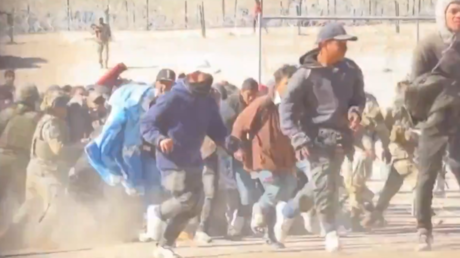 Migrants break through security barrier at US border (VIDEO)
Migrants break through security barrier at US border (VIDEO)
There are thought to be around 10.5 million illegal immigrants living in the US, according to data compiled by Pew Research in 2021. However, at least 6.3 million more have entered the US in the years since, according to figures from the Department of Homeland Security, potentially bringing the total to almost 18 million.
An earlier Pew study found that approximately two thirds of illegal immigrants in the US had been there more than a decade. Counting only those immigrants present in the country in 2021, the removal program reportedly mulled by Biden could result in around six million of them being made permanent residents.
Only US citizens can vote in federal elections. However, permanent residents can apply for citizenship after five years, or three years if married to a US citizen.
Read more Musk reveals major political flip
Musk reveals major political flip
Biden’s first actions as US president included signing a raft of executive orders repealing almost all of former President Donald Trump’s immigration restrictions. He has since unsuccessfully lobbied Congress to pass a bill offering a path to citizenship for more than 10 million illegal immigrants, and sued the state of Texas for attempting to enforce federal immigration law.
“Biden’s strategy is very simple,” Musk tweeted in February. “1. Get as many illegals in the country as possible. 2. Legalize them to create a permanent majority – a one-party state. That is why they are encouraging so much illegal immigration. Simple, yet effective.”
In the US, racial minorities typically vote Democrat. Aside from potentially creating future voters, illegal immigration can give certain states greater representation in Congress, as the number of seats assigned to a state in the House of Representatives is determined by its overall population, which includes those present illegally.

